#Like in general I don’t mind media where the concept is “demons are real and they are evil and must be destroyed”
Explore tagged Tumblr posts
Text
I am not immune to “Dad’s on a hunting trip and he hasn’t been home in a few days”
#In other words I have finished Lockwood and co (how maddening that there isn’t more to see)#And I have started watching a little spn#For the vibes#the first few seasons are so Americana#plus! They are shot on film! And the lighting is superb!#The vibes!!!#I cannot in good conscience get behind the wacky Christianity stuff they do as the show goes on#But I think that doesn’t really start till after the first two seasons?#Like in general I don’t mind media where the concept is “demons are real and they are evil and must be destroyed”#So I know they’re killing ghosts and monsters and demon hunting and what not#It’s when they start saying weird things about angels and heaven and God that I find it disturbing and blasphemous#Or vice versa if they’re like “wow demons are our friends and they are good actually!”#I can’t vibe with that either#Which is why good omens and later spn are not for me#Mixed feelings about Buffy…never could decide what was the vibe with vampirism there
4 notes
·
View notes
Text
“The bulging eyes and the twisted mouth” - Violence, Violent Imagery & Black Horror

TRIGGER WARNING: mentions of death, violence, blood, hate crimes, antiblackness, police violence, rape
Note! I am going to be speaking from a Black American point of view, as my identity informs my experience. That said, antiblackness itself is international. The idea of my Blackness as a threat, as a source of fear and violence to repress and to destroy, is something every Black person in the world that has ever dealt with white supremacy has experienced.
There are two things, I think, that are important to note as we start this conversation.
One: there is a long history of violence towards Black bodies that is due to our dehumanization. People do not care for the killing of a mouse in the way they care about a human. But if you think the people you are dealing with are not people, but animals- more particularly, pests, something distasteful- then you will be able to rationalize treating them as such.
Two: even though we live in a time period where that overt belief of Blackness as inhuman is less likely, we must recognize that there are centuries of belief behind this concept; centuries of arguments and actions that cement in our minds that a certain amount of violence towards Blackness is normal. That subconscious belief you may hold is steeped in centuries of effort to convince you of it without even questioning it. And because of this very real re-enforcement of desensitization, naturally another place this will manifest itself is in how we tell and comprehend stories.
There are also three points I'm about to make first- not the only three that can ever be made, but the ones that stand out the most to me when we talk about violence with Black characters:
One: Your Black readers may experience that scene you wrote differently than you meant anyone to, just because our history may change our perspective on what’s happening.
Two: The idea that Black characters and people deserve the pain they are experiencing.
Three: The disbelief or dismissal of the pain of Black characters and people.
You Better Start Believing In Ghost Stories- You’re In One
I don’t need to tell Black viewers scary fairytales of sadists, body snatchers and noncoincidental disappearances, cannibals, monsters appearing in the night, and dystopian, unjust systems that bury people alive- real life suffices! We recognize the symbolism because we’ve seen real demons.
Some real examples of familiar, terrifying stories that feel like drama, but are real experiences:
12 Years a Slave: “This is no fiction, no exaggeration. If I have failed in anything, it has been in presenting to the reader too prominently the bright side of the picture. I doubt not hundreds have been as unfortunate as myself; that hundreds of free citizens have been kidnapped and sold into slavery, and are at this moment wearing out their lives on plantations in Texas and Louisiana.” – Solomon Northup
When They See Us: I can’t get myself to watch When They See Us, because I learned about the actual trial of the Central Park Five- now the Exonerated Five- in my undergrad program. Five teen Black and brown boys, subjected to racist and cruel policing and vilification in the media- from Donald Trump calling for their deaths in the newspaper, to being imprisoned under what the Clintons deemed a generation of “superpredators” during a “tough on crime” administration. And as audacious as it is to say, as Solomon Northup explained, they were fortunate. The average Black person funneled into the prison system doesn’t get the opportunity to make it back out redeemed or exonerated, because the system is designed to capture and keep them there regardless of their innocence or guilt. Their lives are irreparably changed; they are forever trapped.
Jasper, Texas: Learning about the vicious, gruesome murder of James Byrd Jr, was horrific- and that was just the movie. No matter how “community comes together” everyone tells that story, the reality is that there are people who will beat you, drag you chained down a gravel road for three miles as your body shreds away until you are decapitated, and leave your mangled body in front of a Black church to send a message… Because you’re Black and they hate you. To date I am scared when I’m walking and I see trucks passing me, and don’t let them have the American or the Confederate flag on them. Even Ahmaud Arbery, all he was doing was jogging in his hometown, and white men from out of town decided he should be murdered for that.
Do you want to know what all of these men and boys, from 1841 to 2020, had in common? What they did to warrant what happened to them? Being outside while Black. Some might call it “wrong place wrong time”, but the reality is that there is no “right place”. Sonya Massey, Breonna Taylor- murdered inside their home. Where else can you be, if the danger has every right to barge inside? There is no “safe”.
It is already Frightening to live while Black- not because being Black is inherently frightening, but because our society has made it horrific to do so. But that leads into my next point:
“They Shouldn’t Have Resisted”
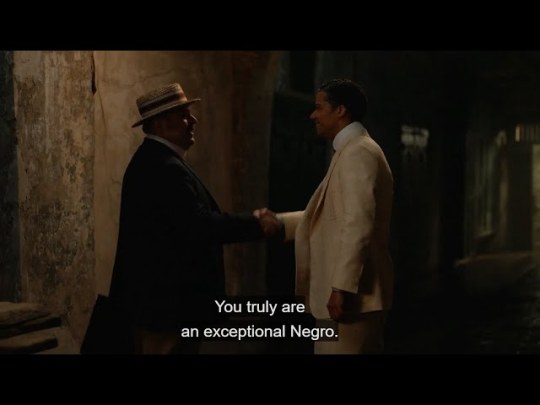
Think of all the videos of assaulted and murdered Black people from police violence. If you can stomach going into the comments- which I don’t, anymore- you’ll see this classic comment of hate in the thousands, twisting your stomach into knots:
“if they obeyed the officer, if they didn’t resist, this wouldn’t have happened”
Another way our punitive society normalizes itself is via the idea of respectability politics; the idea that “if you are Good, if you do what you are Supposed to do, you will not be hurt- I will not have to hurt you”. Therefore, if my people are always suffering violence, it must be because we are Bad. And in a society that is already less gracious to Black people, that is more likely to think we are less human, that we are innately bad and must earn the right to be exceptional… the use of excessive violence towards me must be the natural outcome. “If your people weren’t more likely to be criminals, there wouldn’t be the need to be suspicious of you”- that is the way our society has taught us to frame these interactions, placing the blame for our own victimization on us.
Sidebar: I would highly suggest reading The New Jim Crow, written in 2010 by Michelle Alexander, to see how this mentality helps tie into large scale criminalization and mass incarceration, and how the cycle is purposely perpetuated.
You have to constantly be aware of how you look, walk and talk- and even then, that won’t be enough to save you if the time comes. The turning point for me, personally, was the murder of Sandra Bland. If she could be educated, beautiful, a beacon of her community, be everything a “Good” Black person is supposed to be… and still be murdered via police violence, they can kill any of us. And that’s a very terrifying thought- that anything at any point can be the reason for your death, and it will be validated because someone thinks you shouldn’t have “been that way”. And that way has far less to do with what you did, than it does who you are. Being “that way” is Black.
My point is, if this belief is so normalized in real life about violence on Black bodies- that somehow, we must have done something to deserve this- what makes you think that this belief does not affect how you comprehend Black people suffering in stories?
Hippocratic Oath
Human experimentation? Vivisection? Organ stealing? Begging for medicine? Dramatically bleeding out? Not trusting just anyone to see that you are hurt, because they might take advantage? All very real fears. The idea that pain is normal for Black people is especially rampant in the healthcare field, where ideas like our melanin making our skin thick enough to feel less pain (no), an overblown fear of ‘drug misuse’, and believing we are overexaggerating our pain makes many Black people being unwilling to trust the healthcare system. And it comes down to this thought:
If you think that I feel less pain, you will allow me to suffer long before you believe that I am in pain.
I was psychologically spiraling I was in so much pain after my wisdom teeth removal, and my surgeon was more concerned about “addiction to the medication”. Only because Hot Chocolate’s mom is a nurse, did I get an effective medicine schedule. My mother ended up with jaw rot because her surgeon outright claimed that she didn’t believe that she was in more than the ‘healing’ pain after her wisdom teeth were removed. She also has a gigantic, macabre (and awesome fr) scar on her stomach from a c-section she received after four days of labor attempting to have me… all because she was too poor and too Black to afford better doctors who wouldn’t have dismissed her struggles to push.
As a major example of dismissed Black pain: let’s discuss the mortality rate of Black women during childbirth, as well as the likelihood of our children to die. When we say “they will let you bleed to death”, we mean it.
“Black women have the highest maternal mortality rate in the United States — 69.9 per 100,000 live births for 2021, almost three times the rate for white women, according to the Centers for Disease Control and Prevention. Black babies are more likely to die, and also far more likely to be born prematurely, setting the stage for health issues that could follow them through their lives.”
Even gynecology roots in dismissal (and taking brutal advantage of) Black women's pain:
“The history of this particular medical branch … it begins on a slave farm in Alabama,” Owens said. “The advancement of obstetrics and gynecology had such an intimate relationship with slavery, and was literally built on the wounds of Black women.” Reproductive surgeries that were experimental at the time, like cesarean sections, were commonly performed on enslaved Black women. Physicians like the once-heralded J. Marion Sims, an Alabama doctor many call the “father of gynecology,” performed torturous surgical experiments on enslaved Black women in the 1840s without anesthesia. And well after the abolition of slavery, hospitals performed unnecessary hysterectomies on Black women, and eugenics programs sterilized them.”
If you think Black characters are not in pain, or that they’re overexaggerating, you’re more likely to be okay with them suffering more in comparison to those whose pain you take more seriously- to those you believe.
What’s My Point?
My point is that whatever terrifying scene you think you’re writing, whatever violent whump scenario you think you’re about to put your Black characters through, there’s a chance it has probably happened and was treated as nonimportant (damn shame, right?) And when those terrifying scenes are both written and read, the way their suffering will be felt depends on how much you as a reader care, how much you believe they are suffering.
There’s a joke amongst readers of color that many dystopian tales are tales of “what happened if white people experienced things that the rest of us have already been put through?” Think concepts like alien invasion and mass eradication of the existing population- you may think of that as an action flick, meanwhile peoples globally have suffered colonization for centuries. The Handmaid’s Tale- forced birthing and raising of “someone else’s” children, always subject to sexual harassment by the Master while subject to hate from the Mistress- that’s just being a Mammy.
There’s nothing wrong with having Black characters be violent or deal with violence, especially in a story where every character is going through shit. That is not the problem! What I am trying to tell you, though, is to be aware that certain violent imagery is going to evoke familiarity in Black viewers. And if I as a Black viewer see my very real traumas treated as entertainment fodder- or worse, dismissed- by the narrative and other viewers, I will probably not want to consume that piece of media anymore. I will also question the intentions and the beliefs of the people who treat said traumas so callously. Now, if that’s not something you care about, that’s on you! But for people who do care, it is something we need to make sure we are catching before we do it.
“So I just can’t write anything?!”
Stop that. There are plenty of examples of stories containing horror and violence with Black characters. There’s an entire genre of us telling our own stories, using the same violence as symbolism. I’m not telling you “no” (least not always). I’m telling you to take some consideration when you write the things that you do. There’s nothing wrong about writing your Black characters being violent or experiencing violence. But there is a difference between making it narratively relevant, and thoughtlessly using them as a “spook”, a stereotypical scary Black person, or a punching bag, especially in a way that may invoke certain trauma.
The Black Guy Dies First
The joke is that we never survive these horror movies because we either wouldn’t be there to begin with, or because we would make better decisions and the narrative can’t have that. But the reality is just that a lot of writers find Black characters- Black people- expendable in comparison to their white counterparts, and it shows. More of a “here, damn” sort of character, not worth investment and easy to shrug off. The book itself I haven’t read, just because it’s pretty new, but I’m looking forward to doing so. But from the summaries, it goes into horror media history and how Black characters have fared in these stories, as well as how that connects to the society those characters were written in. I.e., a thorough version of this lesson.
Instead, I wrote an entire list of questions you could possibly ask yourself involving violence or villainy involving a Black character. Feel free to print it and put it on your wall where you write if you have to! I cannot stress enough that asking yourself questions like these are good both for your creation and just… being less antiblack in general when you consume media.
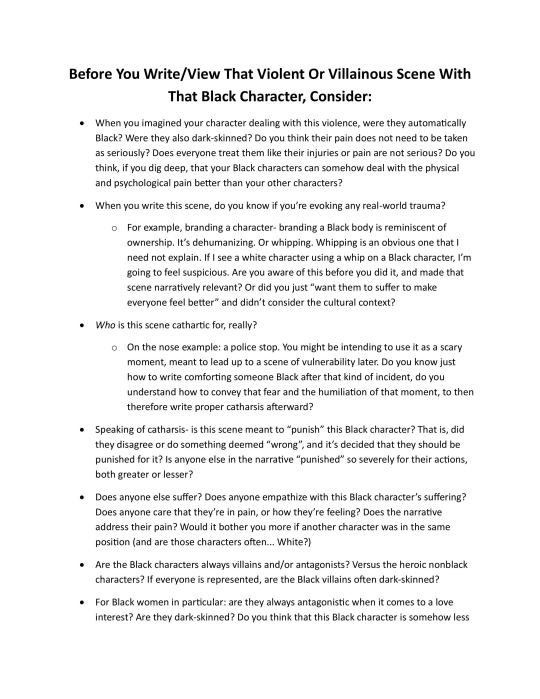
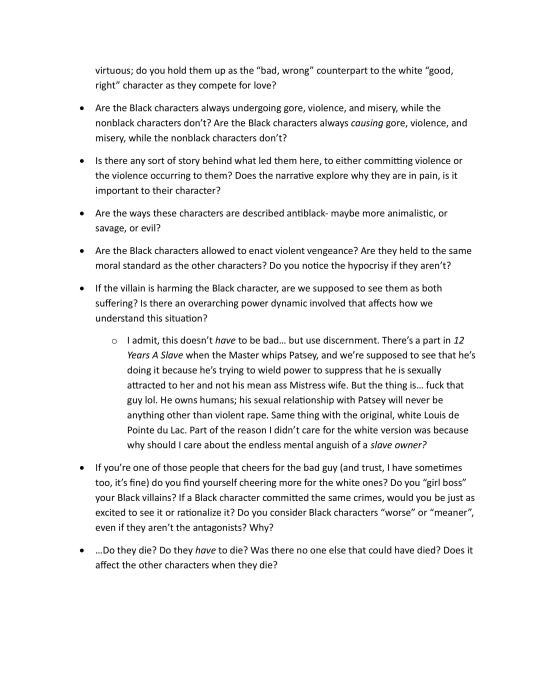
Black Horror/Black Thriller
We, too, have turned our violent experiences into stories. I continue to highly suggest watching our films and reading our stories to see how we convey our fear, our terror, our violence and our pain. There are plenty of stories that work- Get Out, The Angry Black Girl and her Monster, Candyman, Lovecraft Country (the show) and Nanny are some examples. There’s even a blog by the co-writer of The Black Guy Dies First who runs BlackHorrorMovies where he reviews horror movies from throughout the decades.
Desiree Evans has a great essay, We Need Black Horror More Than Ever, that gets into why this genre is so creative and effective, that I think says what I have to say better than I could.
“Even before Peele, Black horror had a rich literary lineage going back to the folklore of Africa and its Diaspora. Stories of haints, witches, curses, and magic of all kinds can be found in the folktales collected by author and anthropologist Zora Neale Hurston and in the folktales retold by acclaimed children’s book author Virginia Hamilton. One of my earliest childhood literary memories is being entranced by Hamilton’s The House of Dies Drear and Patricia McKissack’s children’s book classic The Dark-Thirty: Southern Tales of the Supernatural, both examples of the ways Black authors have tapped into Black history along with our rich ghostlore.” “Black horror can be clever and subversive, allowing Black writers to move against racist tropes, to reconfigure who stands at the center of a story, and to shift the focus from the dominant narrative to that which is hidden, submerged. To ask: what happens when the group that was Othered, gets to tell their side of the story?”

For on the nose simplicity, I’m going to use hood classic Tales From The Hood (1994) as an example of how violence can be integrated into Black horror tales. Tales From The Hood is like… The Twilight Zone by Black people. Messages discussing issues in our community, done through a mystical twist. Free on Tubi! If you want to stop here before some spoilers, it’s an hour and a half. A great time!
In the first story, a Black political activist is murdered by the cops. The scene is reflective of the real-world efforts to discredit and even murder activists speaking out against police violence, as well as the types of things done to criminalize Black citizens for capture. The song Strange Fruit plays in the background, to drive the point home that this is a lynching.
The second story deals with a Black little boy experiencing abuse in the home, drawing a green monster to show his teacher why he’s covered in wounds and is lashing out at school.
The fourth story is about a gangbanger who undergoes “behavioral modification” to be released from prison early. Think of the classic scene from A Clockwork Orange. He must watch as imagery of the Klan and of happy whites lynching Black bodies (real-life pictures and video, mind you!) play into his mind alongside gang violence.
Isn’t Violence Stereotypical or antiblack?

That last story from Tales From The Hood leads into a good point. It can be! But it does not have to be! Violence is a human experience. By suggesting we don’t experience it or commit it, you would be denying everything I’ve just spoken about. We don’t have to be racist to write our Black characters in violent situations. We also don’t have to comprehend those situations through a racist lens.
Even experiences that seem “stereotypical” do not have to be comprehended that way. I get a LOT of questions about if something is stereotypical, and my response is always that it depends on the writing!!! You could give me a harmless prompt and it becomes the most racist story ever once you leave my inbox. But you could give me a “stereotypical” prompt and it be genuine writing.
Let’s take the movie Juice for example. Juice in my honest to God opinion becomes a thriller about halfway in. On its surface, Juice looks like bad Black boys shooting and cursing and doing things they aren’t supposed to be doing! Incredibly stereotypical- violent young thugs. You might think, “you shouldn’t write something like this- you’re telling everyone this is what your community is like”. First- there’s that respectability politics again! Just because something is not a “respectable” story does not mean it doesn’t need to be told!
But if we’re actually paying attention, what we’re looking at is four young boys dealing with their environment in different ways. All four of them originally stick together to feel power amongst their brotherhood as they all act tough and discover their own identities. They are not perfect, but they are still kids. In this environment, to be tough, to be strong, you do the things that they are doing. You run from cops, you steal from stores, you mess with all the girls and talk shit and wave weapons. That’s what makes you “big”. That’s what gives you the “juice”- and the “juice” can make you untouchable.
I want to focus particularly on Bishop, yes, played by Tupac. Bishop, the antagonist of Juice, is particularly powerless, angry, and scared of the world around him. He puts on a big front of bravado, yelling, cursing, and talking big because he’s tired of being afraid, and he doesn’t know how to deal with it otherwise. So when he gets access to a gun- to power- he quickly spirals out of control. His response to his fear is to wave around a tool that makes him feel stronger, that stops the things that scare him from scaring him.
Now, that is not a unique tale! That is a tale that any race could write about, particularly young white men with gun violence! If you ever cared for Fairuza Balk’s character in The Craft, it is a similar fall from grace. But because it is on a young, Black man in the hood, audiences are less likely to empathize with Bishop. And granted, Bishop is unhinged! But many a white character has been, and is not shoved into a stereotype that white people cannot escape from!
Now would I be comfortable if a nonblack person attempted to write a narrative like Juice? Yes, because I’d worry about the tendency to lose the messaging and just fall into stereotype outright. But it can be done! The story can be told!
“But if Black violence bad, why rap?”
The short answer:
“In order for me to write poetry that isn’t political, I must listen to the birds, and in order to hear the birds, the warplanes must be silent.”
Marwhan Makhoul, Palestinian Poet
First, rap is not “only violence and misogyny”. Step your understanding of the genre up; there are plenty of options outside of the mainstream that don’t discuss those things. Second, every genre of music has mainstream popular songs about vice and sin. The idea that Black rappers have to be held to a higher standard is yet another example of how we are seen as inherently bad and must prove ourselves good. We could speak about nothing but drugs and alcohol and 1) there would still be white artists who do the very same and 2) we would still deserve to be treated like humans.
That said, many- not all- rappers rap about violence for the same reason Billy Joel wrote We Didn’t Start the Fire, the same reason Homer first spoke The Iliad- because they have something to say about it! They stand in a long tradition of people using poetry and rhythm to tell stories. Rap is an art of storytelling!
Rap is often used as an expression of frustration and righteous anger against a system built to keep us trapped within it. I’m not allowed to be angry? Why wouldn’t I be angry? Anger is a protective emotion, often when one feels helpless. Young Black people also began to reclaim and glorify the violence they lived in within their music, to take pride in their survival and in their success in a world that otherwise wanted them to fail. If I think the world fights against me no matter what I do, I’d rather live in pride than in shame with a bent head. Is it right? Maybe, maybe not. But if you don’t want them to rap about violence, why not alleviate the things leading to the violence in their environment?
Whether you choose to listen to their words, because the delivery scares you- and trust, angry Black men scared the music industry and society- doesn’t make the story any less valid!
Conclusion
I am going to drop a classic by Slick Rick called Children’s Story. I think listening to it- and I mean genuinely listening- summarizes what I’ve said here about how Black creators can tell stories, even violent ones, and how even the delivery through Blackness can change how you perceive them. Please take the time to listen before continuing.
youtube
I’ve been alive for 28 years and have known this song my whole life, and it just hit me tonight: not once is the kid in this story identified as Black! My perception of this story was completely altered by my own experiences, who told the story, and how it was told.
That’s what I’m trying to tell you. You can tell stories of violence that involve Black characters. I love and adore a good hurt/comfort myself! But you need to be cognizant of your audience and how they’ll perceive the story you’re telling, and that includes the types of imagery you include. It’s not effective catharsis via hurt/comfort for the audience if your Black readers are being completely left out of the comfort. “I wrote this for myself” that’s cool, but… if you wrote racism for yourself, and you’re willing to admit that to yourself, that’s on you. I’d like to think that’s not your intention! You can write these stories of woe and pain without mistreating your Black characters- but that requires knowing and acknowledging when and how you’re doing that!
@afropiscesism makes a solid point in this post: our horror stories are not just fairytales full of amorphous boogiemen meant to teach lessons. Racial violence is very real, very alive, and we cannot act like the things we write can be dismissed outright as “oh well it’s not real”. Sure, those characters aren’t real. But the way you feel about Black bodies and violence is, and often it can slip into your writing as a pattern without you even realizing it. Be willing to get uncomfortable and check yourself on this as you write, as well as noticing it in other works!
If you’re constantly thinking “I would never do this”, you’ll never stop yourself when you inevitably do! If you know what violent imagery can be evoked, you can utilize it or avoid it altogether- but only if you’re willing to get honest about it. You might not intend to do any of this, but it doesn’t matter if you don’t change the pattern, because as always, it’s the thought that counts, but the action that delivers!
#creatingblackcharacters#long post#writing#writing black characters#black character design#black history#media history#cw bugs
1K notes
·
View notes
Note
I'm writing a scene where a cultivater (chinese martial artists who fights ghosts) falls in a forest and I'm trying to figure out how someone who fights on rough terrain would train to fall. I tried looking at martial art/parkour/stunt man tutorials, but I feel like a lot of the basic techniques (rolling, and slapping the ground to distribute weight) wouldn't work well on uneven ground. I also tried looking at hiking advice but they just say to fall on your pack. Any insight?
Chinese cultivators don’t fall, they choose to reacquaint themselves with the ground.
That sounds like a joke, but the best way to understand Chinese cultivators and Chinese fantasy media is to realize that martial arts are the gateway drug to magic. And that will get you into a lot of trouble if you follow that all the way into Martial Arts Give You Superpowers, which is both the outgrowth of the western understanding of Chinese culture and a trope rife with orientalism. Cultivation seems simple on the surface when you’re watching Chinese media, but it’s more than martial arts, it’s more than religion, it’s more than mythology, (though it is all of those too) it’s a genuine transition into metaphysics that reorients how we understand and interact with the world around us. The concepts we see in cultivation come from real martial arts philosophy that you find in Tai Chi, Shaolin, and most other Chinese martial arts. They come from real religions including Daoism, Buddhism, a healthy dose of Confucianism, general mythology and mysticism from a wide range of subcultures, and, to an extent, Animism. If you aren’t doing your reading with the Eight Immortals, Journey to the West, The Legend of the White Snake, and others then you should dig in. I also really suggest watching the live action C-Dramas whether they’re true Wuxia or more Xianxia idol dramas (and in this case the idol dramas are better because the action is slower) so you can acquaint yourself with the stylized martial arts portrayals, a wide variety of choreography, character archetypes essential to motif based storytelling, and the most important aspect of all—wire work.
Understanding and conceptualizing stunt action done on wires is essential when you’re trying to visualize and create action scenes in any East Asian genre. Your first instinct might be to dismiss the stylized movement as unrealistic (it is) but remember that it’s also genre essential. Hong Kong action cinema has a very specific feel to it that’s very different from the way Western cinema structures and films their fight scenes. Even when you’re writing, you’ll want to find ways to imitate it through your visual imagery on the page.
Probably the best way to contextualize cultivators is that they’re wizards who do martial arts. They’ve learned to transcend the limitations in our understanding of reality through knowledge and study to perform superhuman feats. How superhuman? Well, it gets wild. They can be anywhere from Crouching Tiger, Hidden Dragon/Who Rules the World fly through the trees levels to Shang Tsung’s “I’m going to slam my hell reality into your normal reality because commuting to work is too much of an inconvenience.”
Which is to say, they don’t always fight ghosts. Sometimes they fight other martial artists, sometimes they fight other cultivators, sometimes they fight demons, sometimes they fight gods, and sometimes they fight incredibly overpowered monkeys. They’re often monks living in seclusion on a mountaintop, but not always. Cultivation is more of a state of mind. Anyone can do it if they learn how to absorb spiritual energy from the world around them through meditation and breathing exercises. Gods cultivate. Humans cultivate. Animals cultivate. Remember, the demons and the ghosts cultivate too. Sometimes, your master gets reincarnated as a demon. Sometimes, you do. The amount of wacky spellcasting you can do is dependent on how much energy you’ve cultivated, which is dependent on how old you are and how good at cultivation you are. Using the power means you need to cultivate more energy, the greater the spell or difficult the battle then the more energy is lost.
This is important to the question of: how does a cultivator fall?
Metaphorically? Existentially? Physically?
When we’re talking physically, wire work becomes very important. Think of your cultivator as being on wires. If they have the knowledge and understanding to do it, they can slow their own fall through the air to land harmlessly on the ground or twist over like a cat and launch themselves back off the ground to fly at their opponent in a counter attack. If they have the knowledge and understanding, they can teleport. If they lack the knowledge and understanding or want to trick their opponent, they can hit the ground like a sack of potatoes. If they’re relying on basics, they can also smack the ground to counter and spread out the impact then use the momentum from that fall to roll back onto their feet. They’ll do it no matter what terrain they’re on because it’s a basic technique that’s trained into their foundation to the point it’s a reflexive action. Any force distributed away from, and reducing impact on, important body parts like your spine is better than nothing. It’s better to sacrifice your arm than be paralyzed. At its heart, that’s the point of the technique. If you’re able to walk away with a functioning spine, it’s done its job. Your shoulder hurts? That’s normal. Your arm is sprained or broken? Sucks, but that’s better than the alternative that is paralysis and death. For reference, learning to fall was the first lesson my Wushu instructor ever taught me. It is that basic.
A lot of the time when portraying cultivators in media, the goal is to show them as being beyond the limitations of standard martial artists. How vast the gap is between the cultivator and the average human is dependent on both the setting and the cultivator. So, the average martial artist who possesses superhuman talents but hasn’t dedicated themselves to a life of cultivation and cultivators who are new to the path are going to be on the rung below and more likely to be knocked on their ass. Cultivators in the mid-range are more likely to have crafted or trained in solutions to being knocked on their ass which put them in a less vulnerable position while recovering and empowered/enhanced their martial arts. Cultivators in the top tier are usually straight up masters at spellcasting, if they deign to fight at all. Gravity need not apply. Rember, the time it takes you to hit the ground and roll to your feet is time your opponent has to launch a counter attack or move to a better position. Also, it means you’ve taken your eyes off your opponent. This is bad enough against a normal human opponent. Against another mostly immortal or ancient magic user this risks a terrible outcome.
Cunning and strategy are both as important as skill. Wisdom, knowledge, and hard work outweigh talent and raw potential. You’ll have to decide how esoteric you want to be and what limits you want to set. I really urge you to do this because the danger of power creep is real and especially prominent here. A character’s growth in power is often linked to their growth in character or their arc, as they gain a greater understanding of themselves and the world around them their skill increases. The self-discovery/self-reflection/self-interrogation/intense suffering to reach enlightenment portion is just as important and intrinsic to the martial arts portion of Martial Arts Give You Superpowers. It’s easy to focus on the Superpowers or the Martial Arts parts of the equation and miss the genre necessity of character growth. This growth often happens through heaps of steadily increasing trauma. Or, failing to undergo that by being too powerful and thus unable to progress is the joke like it is in Qi Refining for 3000 Years. (Go to hell, Bai Qiuran, you hilariously overpowered monstrosity.)
The irony is that the trajectory in character growth is the same trajectory the average student experiences when practicing martial arts. The only difference is that the power arc is inflated. This includes overcoming ingrained truths that you believe about yourself, about your own abilities, what you believe yourself to be capable of (both good and bad,) about your biases toward yourself and other people, your biases about reality in general, your understanding of good and evil, the potential upending of right and wrong, and facing the greater complexity found in the world at large. The stripping away of these illusions, coming to terms with uncomfortable realizations in a more complicated world, and the gaining of new understanding and confidence are vital to that growth.
Skill isn’t just represented in the power creep, it’s also found in a character’s sophistication and complexity in their approach to combat and life in general. Their awareness both of themselves and of other people, their ability to read intentions, their predictive abilities, their complexity in initiating their own strategy and tactics while also recognizing and countering the plans of others. It’s their insight into human nature and their cunning. It’s not enough to be powerful. The world is full of powerful people and not so powerful people who have the capacity to be just as dangerous. This isn’t Goku and Freeza slamming into each other while the planet explodes in nine minutes. You also need to be smart. It’s also not about being a better person. It’s about being a self-aware person. A person who is self-actualized. Monkey’s growth is in his awareness of the world around him through his experiences and in approaching problems differently rather than becoming less of a little shit. If you grow up in the West, one of the issues you’re going to face is thinking of these hurdles as materialistic rather than emotional or intellectual.
A lot of Western media misinterprets the concepts of “giving up” as physical sacrifice. One of the popular examples is physically sacrificing the person we love. In order to have enlightenment, we must be separated from them. We can’t physically be with them anymore. Whereas under a Buddhist structure, what we are actually sacrificing is our own ignorance, our own preconceptions, and beliefs that keep the world comfortable. Under this structure, we’re sacrificing our preconceived notions of who our loved one is. The person that we invented when we first met and we must force ourselves to come to terms with who they really are. The outcome of this isn’t necessarily going to be bad, but it’s still painful. The person we think we love could be perfectly wonderful. However, they’re not who we imagined. If we choose to hold onto the illusion we created, to ignore the realization that the illusion is the person that we love, we’ll only end up causing ourselves and our loved one more pain. We must fall in love with them all over again. Coming to terms with that is painful. All pain comes from ignorance. In sacrificing, letting go of, or overcoming our ignorance, we grow.
These are the emotional, intellectual, and spiritual challenges necessary for a cultivator because they allow the cultivator to level up. Yes, level up. Whether this is coming from the influx of gaming culture into media at large or because the concept synergizes with the Buddhist goal of progressing through the Six Realms toward nirvana, leveling up is how a cultivator’s increasing power is often depicted. Of course, once we reach the next level we can’t go back except by falling or failing and are no longer the person we once were. This then gets mixed in with Daoist principles of finding divine understanding by living in harmony with the universe. The more understanding we gain of the world, the more energy we can absorb as a result, but our original goals may be lost or changed in the process. If a character begins their journey on the path of revenge, their newfound contextualization of the situation that caused them immense pain may force them to give that revenge up or find they don’t want revenge anymore.
Failure is also an option and often a common part of the story. These stories usually follow characters through multiple lives and rebirths over hundreds and even thousands of years, especially if they’re also gods. This is the existential fall. The fall to the Dark Side. All our heroes are going to go through it at least once. This is also why a lot of Chinese media ends in tragedy with hope for the next round.
-Michi
This blog is supported through Patreon. Patrons get access to new posts three days early, and direct access to us through Discord. If you’re already a Patron, thank you. If you’d like to support us, please consider becoming a Patron.
480 notes
·
View notes
Note
I've always wondered this, but what do you think the Cullen's political viewpoints would be, given their individual backgrounds? if vampires don't change after they turn, then surely they would all be extremely racist (especially Jasper). would this not come up at some point? they aren't like the Volturi because the Volturi are too old to care, but the Cullens are young enough that they have been brought up with opinions on stuff like sexism, racism, homophobia and the like.
Oh fuck.
You get an early answer because otherwise I'll just chicken out and delete this one, pretend I never saw it.
UMMM.
Since I'm guessing you meant American political viewpoints, we need a disclaimer. I am not American, and not too knowledgeable about your politics. Not just in the sense that I don't follow the day-to-day drama, but as I am not an American citizen there are several things I don't know, can't know because I've never lived in your country and therefore can't know what the effects of living in a country ruled by American policies is like. What I do know is based off of the news in the foreign section, social media (by which I mean tumblr posts), and Trevor Noah's Daily Show.
I am an outsider looking in.
Which is really rather appropriate, since the Cullens are too.
The Cullens go to high school and college, Carlisle works, they pay taxes, they own real estate, and submerge themselves in American culture. Esme, Edward, Rosalie, Emmett, and Bella are young enough that this is in many ways their world, and apart from timeouts they've more or less spent their entire lives, human and vampire, integrated into American society.
Not fully integrated, mind you, they do what they need to to fit in and get to school or, in Carlisle’s case, to work. They go no further. No extra-curriculars for the kids, no book clubs for Esme, no game nights for Carlisle. They walk parallel to humans, not among us.
In addition to this they're obscenely rich, which puts them another thousand miles from the experiences of your average American. They won't deal with the health system, which means healthcare is a non-issue, they're not going to need welfare or other social programs, unemployment is another non-issue. Name your issue, and the Cullens don't have personal stake in it. Even the climate crisis won't be a problem for them the way it will for us.
What I'm trying to say is, American political issues are a concept to them, not a lived reality. Just like they are for me. So hey, you made a great choice of blog to ask.
I'll also add here that you say the Volturi are too old to care, and I agree- from an ancient's point of view, racism is a matter of "which ethnicity are we hating today?", and it all looks rather arbitrary after a while. Same with every other issue - after a while it all just blends together into "what are the humans fighting over today? Which Christian denomination is the correct one? Huh. Good for them, I guess."
I can't put it any better than this post did, really. The Volturi are real people, humans are nerds and tumblr having Loki discourse. Aro thinks it's delightful and knows entirely too much about Watergate (and let's be real, Loki discourse as well), but the point I wanted to get at is that politics really don't matter to vampires.
And I don't think they matter to the Cullens either.
So, moving on to the next point while regretting I didn't put headlines in this post, I'll just state that I don't think vampires' minds are frozen. Their brains are unable to develop further, and they can never forget anything, but... well, this isn't the post for that, but in order for this to be true of vampires they would barely be sentient. They would not be able to process new impressions, to learn new things, nor to have an independent thought process. Yes, we see vampires in-universe (namely, Edward, who romanticizes himself and vampires) believe they're frozen and can never change, but there is no indication that this is a widespread belief, or even true. Quite the contrary - Carlisle went from a preacher's son who wanted to burn all the demons to living in Demon Capital for decades and then becoming a doctor and making a whole family of demons. Clearly, the guy has had a change in attitude over the years. Jasper, in his years as a newborn army general, slowly grew disenchanted with his life and developed depression. James initially meant to kill Victoria and hunted her across the earth, then became fascinated and changed his mind about it.
Had these people been incapable of change, Carlisle would still be hating demons, Jasper would be in Maria's army, and James would still be hunting Victoria.
It goes to follow, then, that they are able to adapt to new things.
The question is, would they?
Here I finally answer your question.
So, we have these people who don't really have any kind of stake in politics, who keep up to date all the same (or are forcibly kept up to date because high school) and are generally opinionated people.
Where do they then fall, politically?
(And this is where you might want to stop reading, anon, because I'm about to eviscerate these people.)
Alice votes for whoever's gonna win. She also makes a fortune off of betting each election. Trump's 1 to 10 victory in 2016 was a great day to be Alice. MAGA!
The actual policies involved are completely irrelevant, she does this because it's fun. Election means she gets to throw parties. Color coded parties for the Republican and Democratic primaries, and US-themed parties for Election Night! (Foreigner moment right here: I at first wrote "Election wake" before realizing that's not what y'all murricans call it.)
Alice loves politics. Doesn't know the issues, but she sure loves politics.
Bella votes Democrat. She actually knows about the issues, and cares about them. This girl is a Democrat through and through.
Carlisle doesn't vote. I can't imagine it feels right. Outside of faked papers he's not a US citizen, this is meddling in human affairs that he knows don't concern him.
More, this guy has never lived in a democracy.
In life, Carlisle lived under an absolute monarchy that, upon civil war, became an absolute theocracy. From there he learned that vampires live under a total dictatorship.
For the first 150 years of his life, democracy was that funky thing the Athenians did in history books thousands of years ago, no more relevant to him than the Ancient Egyptian monarchy is to me. Then the Americans, and later other European countries started doing this.
Good for them.
There's this mistake often made by those who view history from a... for lack of a better term, a solipsistic standpoint. A belief that the present day is the culmination of all of history. “My society is the best society, the most reasonable society; all the others had it backwards. Thank god we’re living in this enlightened age!”
The faith in our current system of government is one such belief. We (pardon me if this doesn’t apply to everybody reading this post) have grown up in democracies, being told this is the ultimate form of rule, and perhaps that is true - but remember the kings who have told their subjects they had were divine and the best possible ruler based on that. Remember also that most modern democracies haven’t actually been democracies for very long at all, America is the longest standing at some 230 years (not long at all in the grand scope of things) and they have a fracturing two-party system to show for it.
Every society, ever, has been told they’re the greatest, and their system of government the most just. Democracy is only the latest hit.
This is relevant to Carlisle because he’s immortal and decidedly not modern. Democracy has not been installed in him the way it was the rest of the Cullens, Jasper included. To him- well, it’s just not his world. He has no stakes in our human politics, and as he is older than every current democracy and has seen quite a few of them fall, he’s not going to internalize the democratic form of rule the way a modern human has.
I think the concept of voting is foreign to him.
It requires a level of participation in human society that he’s simply not at. He does the bare minimum to appear human so he do the work he loves, but nothing more, and I find that telling.
As it is I think he'd be iffy about his family doing it. He won’t stop them, but in voting they’re... well it’s kind of cheating. They’re not really citizens, none of this will affect them, and by voting they’re drowning out the votes of real human voters. He does not approve.
Edward votes Democrat. He's... well he’s the kind of guy who will oil a girl’s bedroom window so he can more easily watch her sleep without being discovered, justifying it to himself as being okay because if she were to tell him to get lost he’d stop immediately. Same guy is so sure that he’d leave and never return again if she wanted him to, except this is the man who returned to Forks to hang around his singer, knowing there was a significant chance he might kill her. To say nothing of his Madonna/Whore complex, or of the fact that he tried to pimp out his wife twice, and was willing to forcibly abort her child.
This guy is very much in love with chivalry, with being an enlightened and feminist man who supports and respects women, while not understanding the entire point of feminism, which is female liberation.
He votes Democrat because he’s such an enlightened feminist who cares about women’s rights.
Emmett doesn’t care to vote, but if he has to he votes Republican. The guy is from the 1930′s, and has major would-be-the-uncle-who-cracks-racist-jokes-if-he-was-older vibes.
Esme doesn’t vote, that would require getting out of the house.
More, I just... can’t see it. I can’t see her being one to read up on politics and The Issues, period, but if she has to then I doubt she’d be able to decide.
Jasper doesn’t vote. Alice can have her fun, he does not care.
There’s also the whole can of worms regarding the last time he went to bat for American politics.
I imagine he stays out of this.
Renesmée doesn't vote. She has no stock in the human affairs. Who would she vote for, on what grounds? When Bella tries to pull her to the urns, she points out that she's three years old.
Rosalie, guys, I’m sorry, but that girl is definitely gonna vote Republican. Perhaps not right now as it’s become the Trump party of insanity, but the Mitt Romney type of Republicans? Oh yes.
And for the record, yes I imagine she does vote. To step back from politics would be another way she was relinquishing her humanity, and that’s not allowed to happen. So, yes, she goes to the urns, less for the sake of the politics involved and more because like this, she’s still a part of society in some way.
Now, onto why I think she’s Republican, I think it’s both fiscal and social.
This girl was the daughter of a banker who somehow profited off of the Depression, and who then became part of a family with no material needs that would soon become billionaires thanks to Alice. Poverty to Rosalie is a non-issue, as it is I imagine she views it as a much lesser issue than what she’s had to deal with. The humans can pull themselves up by their bootstraps, Rosalie’s infertility is forever.
Rosalie’s empathy is strongest when she’s able to project onto others, and she won’t be able to project onto the less fortunate at all.
Then there’s the fact that the Republican party is all about traditional family values, and pro-life.
Rosalie, a woman from the 1930′s who idolizes her human life and who‘d love nothing more than to get to live out this fantasy, is down for that. And as of Breaking Dawn she’s vocally pro-life, so there’s that.
This all being said I don’t think Rosalie cares to sit down and fully understand these politics she’s voting for, the possible impact they’ll have- that’s not important. What’s important is what voting does for her.
TL;DR: I bet anon regrets asking.
#long post#twilight#twilight vampires#twilight meta#twilight renaissance#politics#history#twilight history#carlisle cullen#alice cullen#bella swan#renesmée cullen#jasper hale#rosalie hale#emmett cullen
332 notes
·
View notes
Text
TXT Universe Theory: The Dream Chapter
Hello and welcome back to another one of my theories! This theory will be quite long and will take into account everything in the first chapter of TXT’s story. I won’t be doing Minisode 1 or either of the Chaos Chapters yet cause it will give us all a headache if I do, so yes, there will be things missing. Believe me, I know, I’m just pretending like I don’t know anything for the sake of my mind XD Let’s dive into the theory!
The Protagonists
Name: Choi Yeonjun
Keywords: Promise, guilty, sleepless, apricity
Association: Paranoid Park
Metamorphosis: Horns
Songs: Crown, Magic Island
Yeonjun is, perhaps, more relevant than his character wishes he was. Paranoid Park, the book (and perhaps also movie) he’s associated with, talks about a 16-year-old boy who accidentally kills a policeman and tries to cope with it while simultaneously hiding what he did. Yeonjun’s guilt can be seen almost everywhere. His Dream-Self grows horns during Nap of a Star, which are generally associated with evil and destruction, and in Crown he expresses his fear of being evil.
In the teasers for Magic Island he says “I think there’s someone else aside from us #itsmyfault”. And in the teasers for The Dream Chapter: Eternity he adds the hashtags #imscared #itwasjustajoke when revealing his association. He did something that makes him feel guilty. He possibly didn’t kill anyone (I mean, if anyone did, it’s most likely Beomgyu, but that’s not here nor there), but it hasn’t been revealed yet what he did do.
I associate Magic Island with him because it talks about promises and about the Odd Eye Cat, which I will talk about more in detail later, but suffice to say the Odd Eye Cat might have something against Yeonjun. There is a small chance that Yeonjun feels guilty about having forgotten their promise with the Star, since his word is promise. Everyone forgot, but maybe he’s more emotionally aware of it.

Name: Choi Soobin
Keywords: Tomorrow, invisible, understanding, apricity
Association: Le Doulos
Metamorphosis: Elongated ears
Songs: Eternally
Soobin is on the opposite side of the coin with Yeonjun. He too is aware about the promise with the Star, but in a very different way. He is perhaps what we would define as a traditional protagonist, as he can hear the voice of the Star well before anyone else can, even if he can’t remember the promise. The first time we see him perceiving the voice is in Magic Island, that is when he starts to feel separated from the group. He’s still unaware of it, but he knows something that the others don’t and that puts a wall between them. In the Magic Island teaser he uses the hashtag “#IThinkImTheOnlyOneWhosDifferent”, and in the Eternity concept photos he says “Why am I the only one having a hard time?” and “Everything is your fault”. He is also tagged as invisible, which alludes to the fact that he feels distanced from the others, and is also the only one to get no interactions on his posts. The fact that he’s blaming someone might be that he’s aware of the voice or that he knows someone in the group messed up.
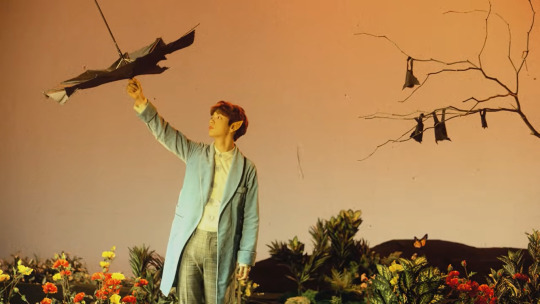
Name: Choi Beomgyu
Keywords: Hope, unfair, relief, serenity
Association: The Catcher in the Rye
Metamorphosis: Spines on the back
Songs: ???
Beomgyu is an interesting if confusing character. Based on how he acts in the MVs, he seems to be rather headstrong and confident, much like the main character, Holden, of Catcher in the Rye, a story strongly related to growing up and leaving the innocence of childhood behind. Holden considers adults (and his life) to be quite unfair, doesn’t trust them, and wants to become a protector of the innocence of other children. However, much like Beomgyu, he’s rather headstrong and careless, moving forward without much consideration, which often gets him in trouble. These aspects can be seen reflected on the Magic Island Teaser, where he writes “What’s the problem? Let’s just do it. #rewind #hope #CantTrustAnyone, as well as the Port teasers from Eternity where he says things like “Who saw me that day?”, “We were all together then, right?” and “I don’t think this is the world I used to know” (which is tagged with “unfair”), and uses the hashtags #NothingToHide, #IsItMyFault?”. We do see him start the fire in both the Magic Island Teaser and MV, which might hint to the fact that he feels it’s unfair to blame him when they were all there, and he doesn’t actually believe himself to be at fault. He was just taking care of them.
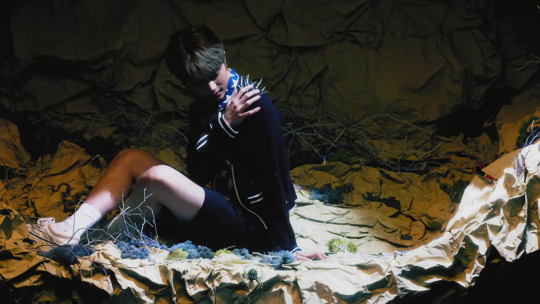
Name: Kang Taehyun
Keywords: Clue, suspicious, breathe, serenity
Association: Philip Marlowe
Metamorphosis: Star eye
Songs: ???
Taehyun’s character is observant and prefers to stay on the sidelines to catch every detail before casting his judgement. In the Magic Island Teaser he says “There’s got to be a way out” with the hashtag #LetsThinkAboutIt, plus, in the Port Teasers from Eternity, he keeps a reasonable suspicion on his team members about who’s truly at fault and uses the hashtags #EverybodyLies and #IWantToKnowTheTruth. This ties in well with his associated character, Philip Marlowe, the private detective. Both characters keep a distance and analyze everything carefully, never resorting to violence. It is worth noting that he keeps Yeonjun’s teddy bear at the end of Run Away, which in the teasers is labelled as “clue”. Taehyun is always observing.

Name: Huening Kai
Keywords: Secret, lonely, longing, apricity
Association: Stand by me
Metamorphosis: Wings
Songs: Nap of a star
Huening Kai is perhaps one of the most complicated and mysterious characters in the story, since his role isn’t as established as the others. He’s constantly out of the loop about the situation that is happening, which is demonstrated by phrases like “What the hell is happening?” (Magic Island Teaser) and “What happened?” (‘Port’ Teasers) as well as the hashtags #OnTheSidelines and #IKnowNothing, as well as two of his keywords being secret and lonely. His associated media is also interesting, as Stand by me talks about a man remembering the trip he did with three of his friends when they were 12 to find the body of a missing boy. At the end of the movie, the main character Gordie, recalls his friends and comments on how much he’ll always miss them and how he’s never had friendships like that again. This raises the question if perhaps one of the boys would be the dead kid the others are trying to find. Kai being kept out of the loop could point to him being it, as he’s always trying to reach for them but can’t quite do it, however it could also be argued that either Yeonjun or Soobin could fill that space as well.

The Setting: The Real World vs The Dream World
Back on the very early BTS theories, a lot of us didn’t think time travel or time loops were the answer, but it turned out we were wrong. At first, when working on this theory, I wasn’t sure where I should draw the distinction between reality and fantasy. In the end, I’ve decided that everything is real but in different ways, and I’ve decided to make the distinction between the Real World and the Dream World; after all, this is called the Dream Chapter.
The Real World is, you guessed it, pretty much just our normal world. Nothing magical or physics-law-breaking to be seen here. The Dream World is, well, a world made of dreams. But remember I said everything is real (I know the names I gave the two realities contradict this, hit me up if you have better suggestions). Whatever happens in the Dream World is just as real as whatever happens in the Real World, it’s just in a different plane of existence. It might also be of interest to note that sometimes these worlds blend.
So, if everything is real in the Dream World, what is real in the Real World? This is a complicated question because even our characters struggle telling reality apart from the dreams, especially because the dreams aren’t just dreams. The fires that occur in Run Away and Can’t You See Me are very much symbolic, but them jumping into the Dream World through the subway in Magic Island is real. The visions they have in Eternally aren’t happening in the Real World either. It’s just a matter of what is supported through other clues and pieces of evidence, which I’ll try to provide.
The Story
So, you know, what is like… happening? Everything is extremely confusing and it took me a while to understand that pretty much all videos are happening like, at the same time? As in, it’s the same event but from different perspectives and slightly different intervals of time. So let’s try to lay down a cohesive timeline.
It all starts with the events narrated in Nap of a Star. When they were children, the five of them (or well, maybe I should say six) met through the Dream world and became such good friends that they promised to meet there again. However, as it happens, they grew up and forgot about it, meeting once again many years later through the school and the company without remembering each other.

While growing up, they have gone through many different things that have hurt and changed them, which manifested in their dream bodies as the “imperfections” that they all have. I believe these imperfections are tied to each of their characters: horns tend to represent evil, which ties in with Yeonjun feeling guilty and blaming himself for everything. Kai’s wings look angel-like, which fits his sweet personality who helps the “demon” (Yeonjun) and is always believing the best about his friends. Beomgyu is very defensive, which translates into his porcupine-like spines. Soobin is a good listener (plus he’s literally the first one to hear the Star’s voice) and Taehyun is good at observing the others. So these are all manifestations of how life has shaped them to be who they are now.
They become very good friends once again and get along well, nice! However, we know things are not perfect, and they have to confront a series of personal conflicts. Especially Yeonjun, who’s so overcome by the negativity in his life that he starts a fire that can’t be put out in Run Away. This fire is metaphorical, and represents all the pain and stress he’s been dealing with. So what do they do? They try to find an escape from all their troubles.

There’s two ways this could’ve happened: the first one is that they stumble with the Dream World by accident on the Run Away MV when they go in through the pool. This seems fitting because of their reactions. After that they research it and Soobin discovers that there’s a secret magical entrance at a train station, as we can see in the Sanctuary Photo Teasers from the Magic comeback in the official BigHit website. The other option is that this accidental discovery didn’t happen and they simply researched. This would turn their visit in Run Away into a “summary” of sorts of their first impression of the place.


[Translation:
Soobin: I saw how to find the hidden magic platform?
Soobin: When you close and open your eyes there, your dream becomes reality
Taehyun: Woah, cool
Taehyun: (not sure about this one) for real?
Soobin: Should we go together?]
Either way, they get there. Of course, as shown by the door being set on fire at the end of Run Away when Yeonjun looks at it, his worries aren’t entirely gone, but at least they’re under control now, or so it seems. This part of the video also ties in with the end of Nap of a Star. All of the children come together to help the “monster” and they reunite at the Dream World once again, awakening the Star.

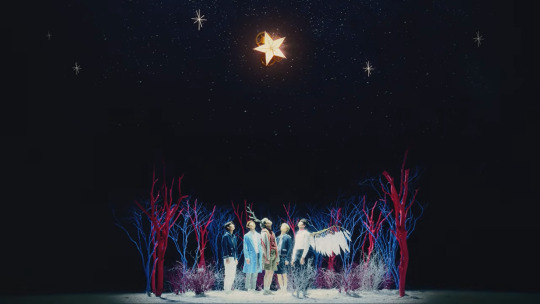
After this, though, weird things begin to happen. Someone or something is trying to reach out to them, and causes them to have really strange dreams. This entity, presumably the Star as marked by the pieces of dialogue, even follows them to their practice room, and keeps begging them to remember them. Yes, I think the Practice Room Ghost and the Star are the same character (and I also think they represent MOA, in a way).

[Translation: Remember my name.]
Here’s where the visions in Eternally come into play. The individual vision each of them has is, physically speaking, nothing more than that: a vision or dream. So they start having these visions, and some of them, especially Soobin who keeps hearing the Star’s voice, start doubting their reality. Plus, weird things start happening in their practice room, so no doubt they end up hearing about the Practice Room Ghost.
They have a conversation about it on the subway, and Soobin goes to mention he had a weird dream but then he backtracks. Obviously, he’s talking about the vision we see in Eternally, because he even says he always wakes up crying from it. In a split second, they decide to stop at the Magic Island using the method that Soobin found previously, and they go have fun there.
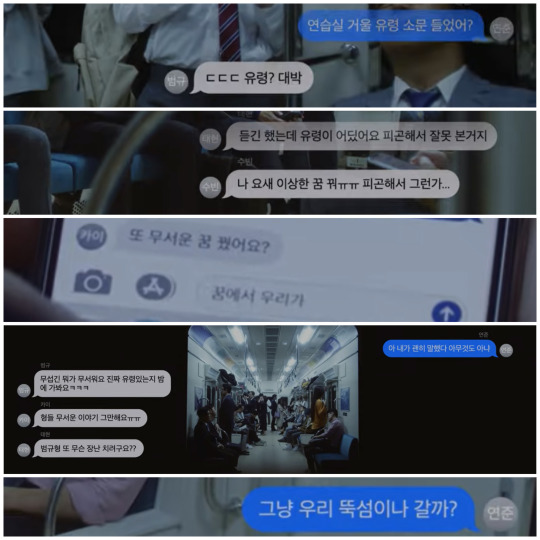
[Translation:
Yeonjun: Did you hear about the practice room’s mirror ghost?
Beomgyu: *sland for shivering* A ghost? Wow
Taehyun: I heard about it. There’s no ghosts, you’re just tired and saw wrong.
Soobin: I’ve had weird dreams lately *cries* Maybe it was because I’m tired...
Kai: Did you have a scary dream again?
Soobin: (deleted message) In the dream we...
Yeonjun: Ah, I shouldn’t have said anything.
Beomgyu: What’s scary about this? If there’s a real ghost let’s go and check at night *laughs*
Kai: Hyungs, stop talking about scary things please *cries*
Taehyun: Beomgyu hyung is joking about this too??
Yeonjun: Should we just go to Ttukseom?]
Naturally, things go wrong, what else were we expecting? Their antics end up setting the magic forest on fire, until they end up destroying the whole Dream World, and it leads us to the start of Eternally. One thing I believe to be very interesting is how, when they’re trapped in the storm, Soobin keeps touching his ears, Kai touches his chest like in Nap of a Star, and Beomgyu touches his shoulder. Yeonjun and Taehyun aren’t properly shown but they probably also touch the affected places.
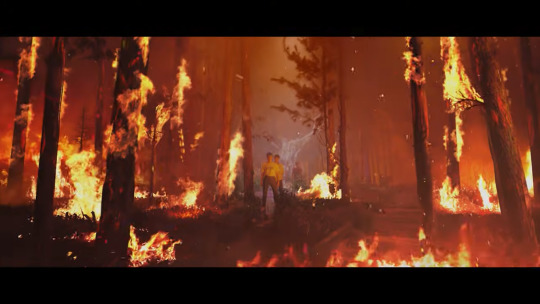

I would argue that Can’t You See Me? is also just a reinterpretation of the conflict they’re going through, both within themselves but also as a group, because they did just destroy their secret place. This is pretty much where the current timeline ends. I’m a bit uncertain if they’re trapped in the Dream World or outside of it without being able to go back, because Taehyun does mention wanting to go back in the Port teasers, but he doesn’t specify where. I want to bet that they’re trapped in the Dream World but I do need to analyze the Chaos Chapter better to decide that.
The Practice Room Star
Yes, this is a play on words, as I fully believe that the Practice Room Ghost and the Star are both the same entity. When they were kids, they made a promise with the Star, but they’ve forgotten it with time, and now that they have reunited and found their way into the Dream World again, the Star wants them back. The Star is probably a very powerful being, since they are able to interfere with the Real World to reach to them, enough to make them confused about their own reality. Their bond seems to be stronger with Soobin, who’s even able to hear them reach out on occasion. It’s uncertain what exactly it is that they want.
The Visions (Eternally MV)
The night of the last day & Song of a Star (Soobin’s visions)
Eternally starts at the end of Magic Island, with the Dream World completely in ruins. Eternally happens before Magic Island, so this dream Soobin has at the beginning is nothing but a prophecy. In the dream, he is holding a book, which we also see Beomgyu with. I think this book is the one they got the information about the Dream World during the Magic era, since the cover is very similar to the symbols we can see in Run Away.
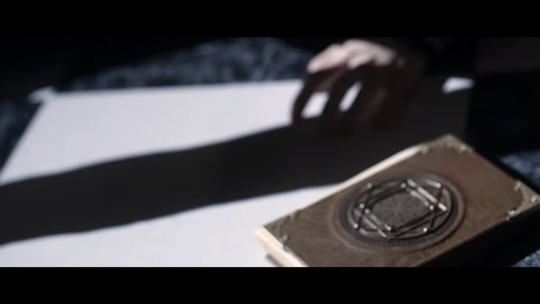
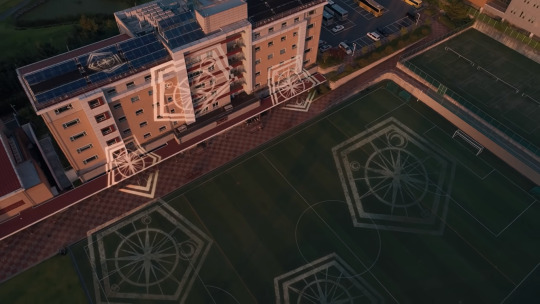
I believe Song of a Star is the Star reaching out to him. He’s the first one to be able to hear the Star, as shown in Magic Island, and he also references the Star’s song in teachers. The kid he sees is probably the version of himself that first entered the Dream World as a kid (or maybe Kai lol), which might be why he wants to cry everytime he has that dream: it’s the nostalgia for a time he left behind.
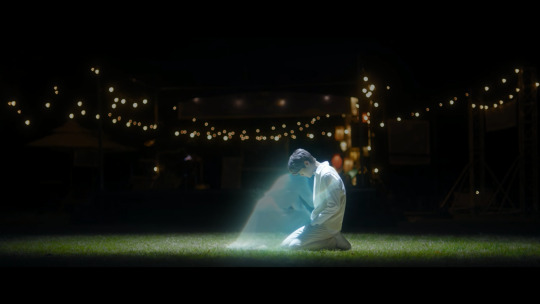
Room No. 17 (Beomgyu’s vision)
While I’m not sure what the number 17 means yet, and my research on numerology yielded no results, this vision is particularly interesting to me. Through it we get to see Beomgyu’s more ‘brash’ nature as he defends the book that Soobin was seen holding previously. If that book is their key to the Dream World, then it makes a lot of sense that he’s trying to protect it. I’m not sure who the other person trying to stop him is, but it does kinda look like things didn’t go well for them after Beomgyu transformed.


Girl of Eternity (Huening Kai’s vision)
Perhaps the strangest of names for visions, this clearly represents how the rest of the members keep moving far away from Kai and become unreachable to him. He mentions several times how he’s clueless about what’s going on and wants to understand, but the rest of them continue to keep him in the dark, so he feels a distance growing between them, which might increase in the future.
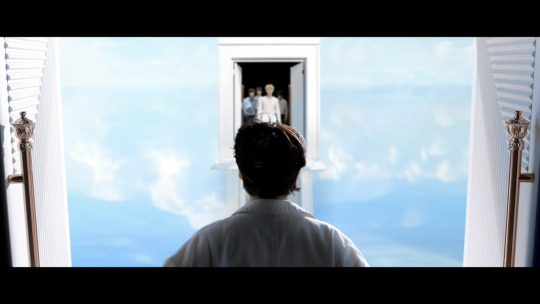
Moratorium of Rest (Taehyun’s vision)
Taehyun’s vision is perhaps the most shocking of all, as it shows us Yeonjun sitting on a chair and covered in spines and purple “paint”. Yeonjun is sitting in the middle of a field of all sorts of violets, and Taehyun tries calling him before realizing the condition Yeonjun is in.
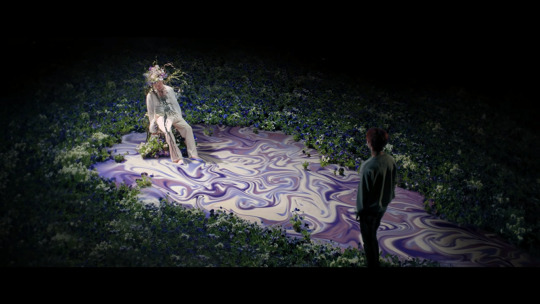
Promise (Yeonjun’s vision)
Yeonjun shares the misfortune with Taehyun of seeing his lifeless corpse, except his vision is much less artistic about it. After finding his body, he sees a fire from the corner of his eye, and right next to it, you guessed it, the odd-eyed cat. His vision in particular finishes with the phrase “I thought it was salvation, then.” And here is where things turn south.
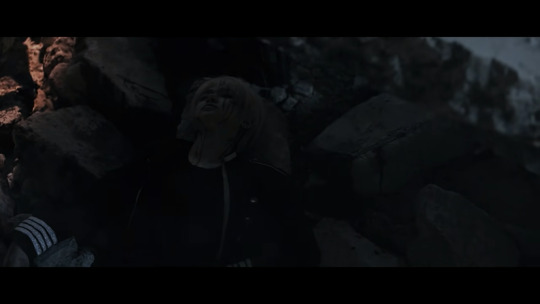

Yeonjun’s promise and the Odd-Eye Cat
I have a very strong reason to believe that Yeonjun is in danger of dying an awful death, and it’s only partially because of the visions. Since Nap of a Star, Yeonjun has been followed by the vigilant eyes of the Odd-Eye Cat almost religiously, and it usually never brings good situations with it. It’s bad enough that the neck cut in Nap of a Star is replicated in Taehyun’s vision, that Soobin sees Yeonjun all bloody in Eternally, and that both Yeonjun and Taehyun see the former dead, but there might be some external clues that hint towards Yeonjun’s upcoming demise.
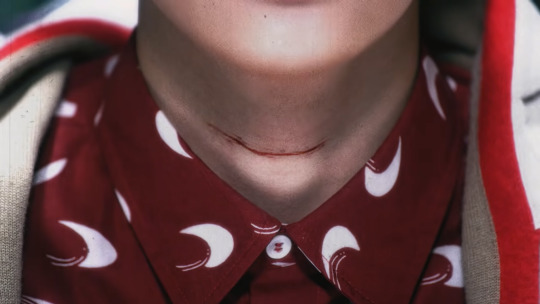

In the official BigHit website for TxT’s discography, where we found out that Soobin researched and figured out the way to go into the Dream World, we can find a picture of Yeonjun reading a book. In English, this book is called The Alchemaster’s Apprentice. This book narrates the story of a black cat who sells its soul to a sort of wizard in exchange for food, since he’s starving to death. The wizard agrees to fatten the cat for a month, after which it will kill it and use its fat for magical purposes.

The cat in this book doesn’t have heterochromia, however I found out some pagan groups in Eastern Europe believe that a different colored eye was a witch’s eye, meaning that the eye has literally been swapped out with a witch’s. I fully believe that Yeonjun made a deal he shouldn’t have, and the Odd-Eye Cat has been sent by whoever made the deal with him to check on him. It might just be that Yeonjun’s time is going to run out very soon, and the visions are trying to warn everyone of that.
Conclusion
Magic exists and TxT might have bitten more than they can chew because they wanted to run away from the problems of real life (relatable). Now, the Star that they made a promise with is trying to reach them, and maybe warn them about something that’s coming. The fact is that they’re not safe, especially Yeonjun, and things might turn south very quickly very soon.
I’ll try to come back soon with the Minisode 1 + Chaos Chapter Theory update, but for now, if you liked this, please interact with the post and check out my other theories here!
#txt#tomorrow by together#tomorrow x together#the star seekers#txt theory#tomorrow x together theory#tomorrow by together theory#txt yeonjun#txt soobin#txt beomgyu#txt taehyun#txt kai#kpop#kpop theory#bluenicorn does theories
45 notes
·
View notes
Text
KarpReviews - Neon Genesis Evangelion (1995) and End of Evangelion
It took me a good while to really get into anime. Well, maybe that’s technically not true, as I grew up with the Pokemon and Yu-gi-oh anime series. That’s really where my exposure to the medium stopped for a long time, though. There was scattered influence, such as an ephemeral viewing of Spirited Away on Cartoon Network, and access to one of the Naruto fighting games. Ultimately, though, I hardly knew what anime was until high school. It was around this time that I would occasionally stay up late to watch Toonami on Saturdays. Toonami provided me with several of my first and favorite anime series, including Cowboy Bebop, Deadman Wonderland, and Soul Eater. One night, however, I found myself treated to something completely bizarre.
I can’t say for sure exactly what I had watched, though my current knowledge suggests it was one of the Evangelion recap movies. These are abridged versions of the series that tell the story in a more condensed format, though it’s possible I just caught a few episodes of the regular series. The show itself was overwhelmingly confusing and bizarre, with concepts my teenage mind struggled to grasp, and characters that seemed strange and depressing. It certainly didn’t help that I was watching this show in the dead of night while sleep repeatedly attempted to pull me down. I was mesmerized regardless, and the images I saw never left my mind.
It wasn’t until now that I decided to finally watch the series in its entirety. I was excited to figure out exactly what I’d seen, why the robots in the show looked the way they did, why the “monsters” had such abstract and strange designs. Most importantly, I wanted to experience one of the major pieces of Japanese animation that had influenced so much of popular media. Thankfully, Neon Genesis Evangelion did not disappoint.
To briefly summarize for those who still haven’t seen the show, the main premise is that, for one reason or another, Earth has become assaulted by powerful beings known as Angels - strange monsters that threaten humanity with their otherworldly power. An organization called NERV, led by Commander Gendo Ikari, plans to protect humanity and destroy the Angels with mysterious and strange humanoid mecha named “EVAs.” They can only be piloted by particular children, one of whom is the main character and Gendo’s son, Shinji. The Angels themselves, as well as their lore, hearken to Christianity, though in the same way that American media loosely uses Greek mythology. While the premise of the show seems to match that of other mecha, such as Gundam or Macross Saga, Evangelion is more about it’s heavy, layered theming as opposed to mecha and kaiju battles. Evangelion’s storytelling is rich and layered, yet I never found it to be overwhelming or poorly paced. Even though it’s dark tone is prevalent throughout, the battles between EVAs and Angels are still exciting and enjoyable on their own, each encounter building the stakes higher and higher, until it almost feels that everything will suddenly explode. Almost.
Visually, I think Evangelion holds up phenomenally. The animation style is instantly recognizable while still carrying the same charm that many 90′s anime have. Characters are expressive and animated when they need to be, and backdrops are detailed and colorful. I was blown away especially during the show’s numerous fight scenes. Unlike the bulky mechs featured in most media at the time, the EVAs are nimble and powerful, often performing acrobatic feats or creating stunning displays of destruction. I was absolutely captivated by the designs of the EVA’s and Angels, just like I was in high school. The EVA’s are both incredible and sinister, immediately intriguing just from their design alone. Just looking at one makes you want to know more about them. The character designs are simple but still memorable, which matches their personalities well. What I love most about the visuals of this show, however, isn’t the fluid action or expressive characters, but the implementation of long shots and surreal visuals. Several times throughout the series, the show will linger on a single frame for an extended period of time. There’s no dialogue in these segments, just ambient noise or background music. These moments are some of the most engrossing, trapping the viewer in a single uncomfortable moment, such as the gruesome aftermath of an Angel attack, or a long elevator ride following an argument between Asuka and Rei.
Speaking of, the characters in this show are truly fascinating. Nearly every character is layered and interesting, and each one has their own ways in which they deal with the pressure and terrors of the world around them. I was surprised with how much I ended up liking Shinji (during the main series that is, but we’ll get to that) whose awkward and conflicted personality can be easily polarizing to viewers. I thought Asuka was a nice foil for Shinji, and an entertaining character on her own. She is a bit rough around the edges, and her loud and often self-centered personality can be grating at times, but ultimately her presence is a positive one, and I feel she inadvertently pulls other characters out of their shells. Rei, the third part of our pilot trio, is quiet and mysterious, and she adds to a lot of the show’s intrigue. My favorite character is easily Misato. On top of keeping the younger character’s intense personalities in check, her own story is one that the show graciously gives a lot of attention to. Watching her start to work through her demons was thoroughly compelling to me, and I felt that even through her faults she always tries to be mindful of the people around her. Ryoji was another character that I was a bit worried about after his introduction, but thankfully he had much more going for him than his flirty, aloof attitude. The one person that I never got totally sold on, though, is Gendo Ikari. While he’s certainly integral to the plot, his character was too nuanced for my liking, and it dampened his impact on the story. He’s also one of the characters who I can confidently say isn’t a good person, making his presence even more distasteful. Important for sure, but generally unpleasant.
Perhaps the most memorable piece of this show is it’s music. Truly, every single track within this anime screams “iconic.” The catchy drumming of “Decisive Battle” constantly plays within my head, a track that helped every Angel encounter feel like an elaborate chess game. “Angel Attack” has a memorable, intense melody that felt appropriate for the show’s surreal and powerful monsters. Of course, nothing needs to be said about one of the most iconic anime openings ever, “Cruel Angel’s Thesis.” By far my favorite, though, has to go to “Komm, süsser Tod.” Playing during the finale of End of Evangelion, this hauntingly beautiful song fits the show perfectly, from it’s use of choir-like vocals to the chaotic mess of strings towards the end. Every song in the show’s OST is wonderful, and I often listen to various tracks while I’m working. Even if you don’t want to watch the show, I strongly urge you to check out the soundtrack anyway.
Deep within these varied, elaborate pieces, behind the catchy music and incredible action set pieces, Neon Genesis Evangelion is a show about depression. Each character struggles with this in a different way: Shinji keeps his distance from those around him, despite needing more than anything to connect to another human being. Asuka searches for validation from the people around her, becoming angry when anyone takes attention away from her, afraid that she’ll be ignored or forgotten. Rei struggles in general to feel like a real person, to become more than her birthright and her purpose. Misato tries to drown herself in her work and in alcohol, keeping herself in denial while she tries to distance herself from her past. In some ways, the EVAs represent the responsibilities of everyday life, highlighted by Shinji’s struggle to fully commit to his obligation of protecting mankind. The characters in this show are broken, messy husks, and for almost the entire show these struggles seem impossible to overcome. These themes and motifs become especially true starting with episode 16, where the show begins to slow down and focus on its characters as the final Angel threat is thwarted. Ultimately, however, the message of the original series is a hopeful one, sending the viewer off with the message that only when you’re able to help yourself can you finally start to truly connect with and help others. It’s a poignant message and one that I think the show earns by weaving it’s theme of depression throughout the entire show, not just focusing on it near the end.
The end, however, is where Evangelion becomes a truly fascinating piece of media. Part of what makes this true is that, actually, Neon Genesis Evangelion has two endings: the final two episodes of the show, and the movie appropriately titled End of Evangelion. The series has separate endings for a couple of reasons, actually. While I won’t explain it in depth here, the summarized version is that the latter episodes of Evangelion, starting with episode 16, are subjected to a bit of a paradigm shift following production issues and budget cuts. These later episodes are where the various characters’ faults take the forefront of the narrative, and the action scenes become scarce. The final two episodes take on an especially bizarre nature, analyzing the characters within the context of the show, using abstract visualization and disjointed dialogue to do so. Personally, I’ve grown to appreciate this ending. As I mentioned before, while the focus does change towards the end, I still believe the show was always more about the heavy themes than it was about the robot fights. Many, however, do not share my opinion. When the finale originally aired, many viewers were incredibly unhappy. Unreasonably so, as thousands sent angry letters and death threats to the studio, griefing the creator for his vision. They called for a different ending, one with a more satisfying conclusion, with more action and a clearer sendoff for Shinji and the other characters.
Needless to say, creator Hideaki Anno obliged them.
Releasing in 1997, End of Evangelion is perhaps the most spiteful piece of artistry ever conceived. While the original series ended with a message of hope, this film turns the series on its head and creates a narrative that simply reeks of despair. Junko Enoshima could only dream of creating something so explicitly hopeless. While Shinji takes his first steps towards healing in the original ending, this film features a Shinji who has completely and utterly given up. He’s succumbed to his base desires, numb to the world around him in a way that’s turned him into a monster. His thoughts and actions are violent and abusive, he becomes completely deaf to the needs of those around him, and in a few short minutes of this film, he becomes almost completely irredeemable. He knows he’s become a despicable shell of a human being, but he almost seems to revel in that fact. This version of Shinji is utterly useless, and his actions - or rather inaction - causes the complete destruction of everyone he loves. This film is depressing, it’s uncomfortable, and it’s absolutely unconscionable...
And I loved it.
In context, it’s hard not to imagine that End of Evangelion is a deliberate slap in the face to the fans who so ruthlessly tore apart the original ending of the show. It completely reverses the progress that was made in the original series, opting to create an ending that is more intense and action-packed, but at the price of turning Shinji, the audience surrogate, into a complete bastard. Watching the film for the first time is almost infuriating, especially as Shinji repeatedly destroys everything in his wake through his own self-loathing. Yet, after letting the film sit in my mind for a while, I found it to be a truly unique piece of art. It’s hard to stomach, and I don’t think I can recommend it, especially on its own, but End of Evangelion is a truly fascinating film.
As a whole, I’m extremely happy I decided to go back in time to watch this old classic. I believe it holds up incredibly well overall, and it has so much to say in just 26 episodes. Watching it reminded me a lot of Samurai Jack and Cowboy Bebop, especially with its use of masterful long takes and thick atmosphere. If you haven’t given this anime a shot, I strongly recommend checking it out on Netflix or wherever you can get your hands on it. It may not be for everyone, but for this kaiju-loving gal, it exceeded every expectation.
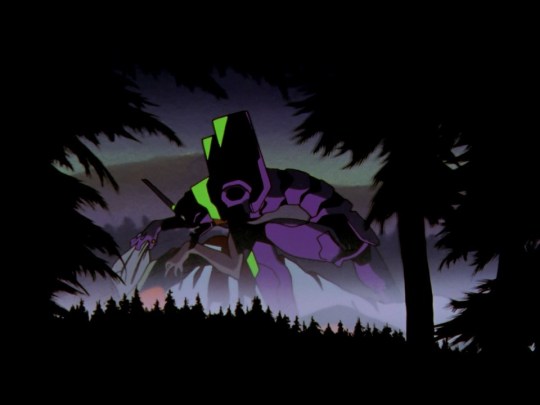
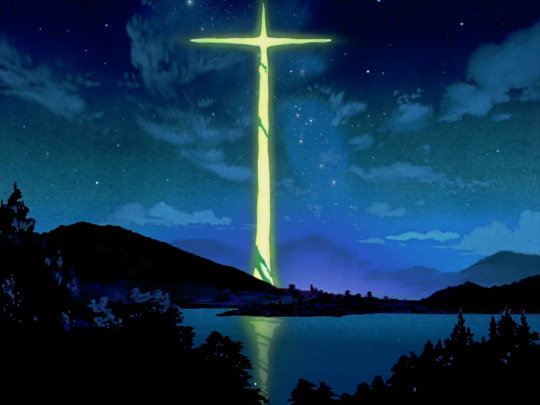
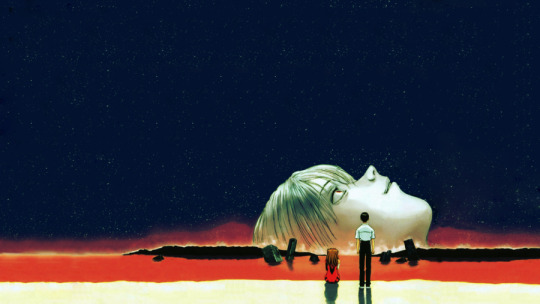

45 notes
·
View notes
Text
Okay, so I’ve got way more reactions to P5 Strikers for a longer post later, but I want to keep playing, so I’m recording some thoughts and predictions after the first boss (and all the cutscenes thereafter) before they get derailed or confirmed by later events.
This is going to be a story about cycles of violence, I suspect. On the whole, I really liked how the game handled that with Alice: what happened to her was terrible and traumatic, and in no way excuses what she did in return. And Ann was still desperate to save her. I’m hoping we see more of that: understanding and also condemning, all folded in together.
Oh!!! And as I’m writing this, I’m thinking about how that ties in thematically with what I suspect may be the deal with jails and monarchs. See, palaces, we know from Yaldabaoth, were jails in their own sense--prisoners kept in isolation from the general population of Mementos and the Prison of Regression, shunted over into their own private little pocket dimensions where they could rule whatever they wanted. (And I have some more complex thoughts thoughts about the specific ways that system enables further violence by rewarding bad behavior, in terms of Yaldie’s motives and also reflections of the real world, but that’s another post for another day.) This, on the other hand, feels far more like the entire jail system is just big sprawling pocket remnants of that universal prison complex with all the wardens gone. Now individual shadows have clawed their way up to becoming monarchs over their own pockets, but being queen of your own jail still makes you in jail. The monarchs of these places, I suspect, will all be prisoners of their own pasts and the violence that taught them to turn to violence, which is a thematically cool way to do this and I like it.
Actually, framing it that way is making the whole concept of a cycle-of-violence P5 game grow on me. One of the things I honestly liked about the original P5 was that, with one notable exception, we never once gave a shit about the tragic backstories of the villains we took down. Sure, we’d learn a bit about them when we stole the Treasures, sometimes, but it didn’t really matter--because the important thing about each antagonist was the harm they are doing now, not forgiving them because of the harm done to them in the past. So I had a little bit of concern that this seeming reversal of that trend might veer off into too much sympathy for the aggressors, bur I’m thinking (I’m hoping) that what we’re actually getting is a look at how systematic violence can turn victims into further oppressors. And given that P5 was always a game about systematic violence, this ends up feeling like a natural progression rather than undercutting the original concept. Heck yes.
Speaking of systems of violence: yep, I am using social justice lingo when talking about this game, and no I do not think I am projecting or reading too far into it, because damn is P5S not remotely fucking around with how it feels about cops. Like, Zenkichi Hasegawa aside (and oh boy do I have thoughts on him), dear god do I love Haru sweet smile ‘Sorry, we just despise the police, is all!’ Okumura. Meanwhile, our hordes of faceless trash mob enemies are literally vaguely police-shaped Shadows in riot gear. We spent a major battle blowing up cop cars. Like. Persona 5 said prison abolition, to the tune of spending our entire game trying to break out of our metaphorical Velvet Room prison and boss-battling our final endgame through the cognitive prison of all society. P5 Strikers apparently said, ‘you know, we were too subtle last time, and also Fuck The Police.’
Okay and actually let’s talk about ol’ Zenkichi there (hell yes, team, you go right ahead calling this adult authority figure by his given name with no honorifics even in the original Japanese, I support you). My hope at this point is that we get his development as a parallel to the same things we’re seeing in these jail monarchs: as part of a cycle of violence. He’s clearly got some backstory if we’re meant to care about him this much, and it led him to this place of becoming a cop out of a desire to help or to hurt or whatever, but the road he followed brought him to this role of an authority figure with no issue manipulating, using, threatening, and borderline abusing his power over teenagers. (I say ‘borderline’ because he hasn’t moved beyond threats yet, but it’s pretty clear he wouldn’t mind doing so if necessary--we saw him beat up a drunk, so yep.) Which, can we talk about the parallels between that scene and Akira’s original confrontation with Shido? Drunk man harassing a woman, drunk man ends up on the ground. Except: Akira was alone on a dark street with only the three of them there, and Hasegawa’s surrounded by people who could intervene, help, or even side against him in court if anyone cared what they had to say. Except the drunk office-worker is clearly unimportant and unthreatening, while Shido was forceful in pride and anger even while drunk. Except Shido’s victim was terrified, while Ann is mostly just disgusted, surrounded by friends, in very little actual danger. And Akira never touched him, never pushed him, just took one step up to try and help. Zenkichi Hasegawa provoked a mostly-harmless drunk into attacking him for the excuse to punch him unconscious on purpose. Akira’s Shido flashback was framed in every way to show us the ways our protagonist was powerless. Zenkichi’s scene parallels it to show us a dozen different ways this man is powerful and unafraid to use it--not just against those he deems unworthy, but also, if he so chooses, over those he saves. I am really enjoying this guy as a character. Every single time the PTs have no use for his shit, I cheer. Him being unbalanced by the metaverse is glorious, and please let Morgana continue to freak him out by existing and Haru continue to freak him out with sweet, pleasant smiles while talking about how she’s very sorry, it’s simply that all cops are bastards, for the rest of the game. (Additional note: @errant-light and I have been watching and talking about a whole bunch of Fullmetal Alchemist lately, and apparently Hasegawa’s Japanese VA is also Roy Mustang. Which has just been a delightful detail re: this guy’s manipulative bastardry, because in some ways I am pretty sure the mass-murdering war criminal version of this character is the better person.)
Alice as a really obvious parallel to Kamoshida is interesting, I think. Even to the point of being a king and queen ruling a castle--and don’t think I didn’t see that “Birdcage of Lust” label! I don’t love having a pretty young social media influencer as our sin of lust (but even that’s complicated, because Alice was pretty clearly caged and abused for daring to feel lust in the first place, NOT for preying on people, except that then she did get predatory and it’s all a little thorny and not especially kink-positive). I do have a lot of feelings about Shujin as this place where Kamoshida abused and preyed on people with total abandon, while Alice was demonized for daring to even look at boys in the wrong way. I really wonder if they ever met. It’s a cool counterpoint, and a really cool counterpoint to Ann, who was likewise a victim of that school and refused to let it turn her into an abuser herself. (I have a LOT of feelings about Ann right now.) I’m really hoping future jail monarchs continue to mirror palace rulers in interesting ways. In theory, next up is vanity, and gosh knows there’s plenty to fuck around with in playing against Yusuke’s lonely artistic yearning to be understood. I’m very excited.
Apparently, the internet says this game takes 35 hours to play. Me and my 21-hour playtime so far have some Opinions About That.
#C plays persona#persona 5 strikers#what if I just became a persona blog#persona 5#NO SPOILERS IN THE NOTES PLEASE
25 notes
·
View notes
Text
Hi Good Omens fans, ever since making this blog, and trawling through the archives for old art, I have been thinking again about trends from before the TV-show, and the way people draw Aziraphale and Crowley. I wanted to make this post addressing it but this is not “discourse” or to start a fight, in fact I would be perfectly content if all I did was make people think critically about what I am about to say and not even interact with this post at all, but I feel like I need to say it.
Talking about any racist undertones to the way people draw our two favorite boys usually makes people dig their heels in pretty fast. This is not a callout post for any artist in particular, this is not me trying to be overly critical of artists especially since they have more talent and skill than I do, and I’m going to address some common counterpoints that I frankly find unsatisfactory. Let’s just take a moment to set aside our defensiveness and think objectively about these trends. It took me a while to unlearn my dismissive attitude about these concerns so maybe I can help others get over that hurdle a little faster. Now let’s begin.
I’ve been kicking around the Good Omens fandom since maybe 2015 and for art based in book canon, whether it was made before the TV show came out, or because the artist is consciously drawing different, original designs, I’m going to estimate that a decent 75% of all fanart looks like this

Aziraphale is white and blonde and blue-eyed while Crowley is the typical “racially ambiguous” brown skin tone it’s become so popular to draw podcast characters as nowadays.
And the question is why? With the obvious answer being “it’s racist,” but let’s delve a little deeper than that.
A common thing I hear is that people get appearance headcanons fixed in their mind because the coverart of the book pictures the characters a certain way. My first point is this only shifts the question to why the illustrators drew them that way, when there aren’t many physical descriptions in the book. My second point is that while there definitely are cover arts that picture Aziraphale as cherubic, blonde, and white and Crowley as swarthy, dark-skinned, and racially ambiguous...
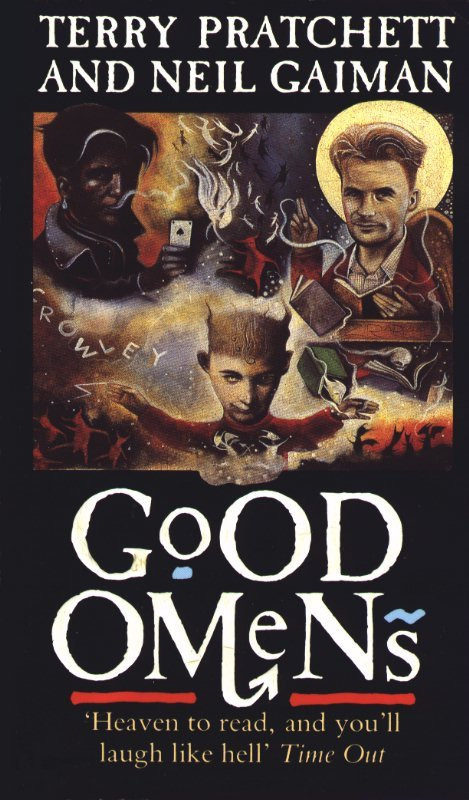
(side note: why is Crowley’s hand so tiny? what the hell is going on in this cover?)
It’s much more common for the covers to simplified, stylized, and without any particular unambiguous skin tones
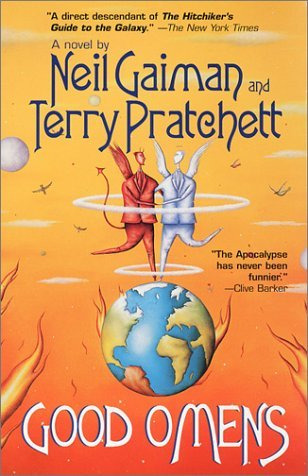
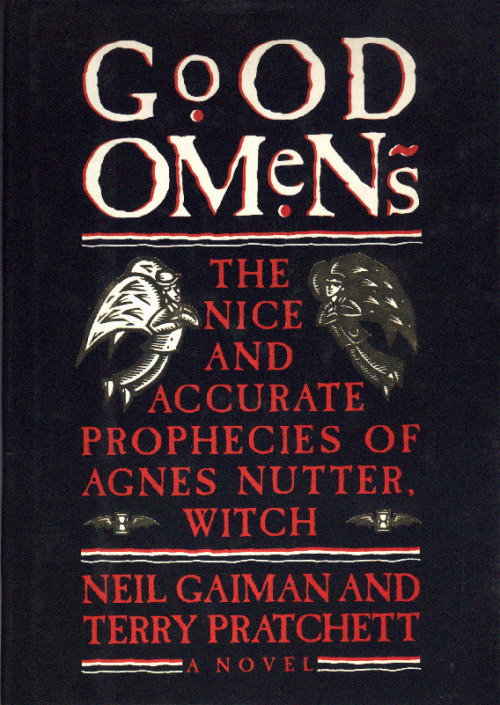
I don’t know about the UK but the most popular version in the United States is the dual black and white matching covers
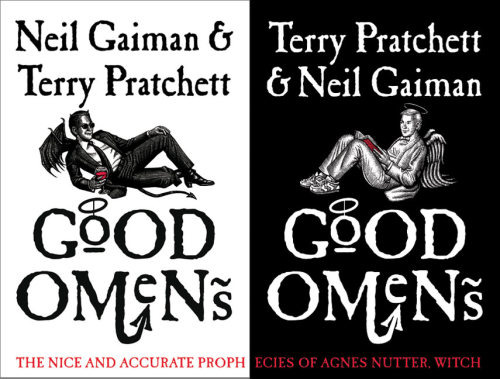
And while you could make an argument that the shading on Crowley’s face could suggest a darker skintone, it seems obvious to me that lacking any color these are not supposed to suggest any particular race for either of these two, and the contrasting colors are a stylistic choice to emphasize how they are on opposite sides. If anything, to me it suggests they are both white.
In short I simply do not buy the argument that people are drawing Aziraphale and Crowley this way because that’s how they were represented on the cover art of the book. If you draw them the way they are on the cover then whatever, I don’t care, but I don’t believe that’s what’s driving this trend.
The second thing people will say is that Good Omens is a work of satire, and it’s based in Christian mythology which has this trend of depicting angels as white, and it is embodying the trope of a “white, cherubic angel” paired with a dark-skinned demon for the explicit purpose of subverting the trope of “white angel is good, dark demon is bad” since Aziraphale is not an unambiguous hero and Crowley is not a villain. “It’s not actually like that because Crowley isn’t a bad demon, and Aziraphale isn’t actually a perfect angel” is the argument. This has a certain logic to it and allows some nuance to the topic, but to this I say:
Uncritically reproducing a trope, even in the context of a satire novel, is not enough to subvert it. Good Omens is not criticising the racist history of the church, and while the book does have some pointed jabs at white British culture (such as Madam Tracy conning gullible Brits with an unbelievably ignorant stereotype of a Native American) it is not being critical of the conception of angels as white and blonde or the literal demonization of non-white people. That’s just not what the book is about. So making the angel white and the demon dark-skinned, playing directly into harmful tropes and stereotypes, is not somehow subversive or counter-cultural when doing so doesn’t say anything about anything.


Please consider fully the ramifications of the conception of white and blonde people as innocent and cherubic and dark-skinned people as infernal and mischievous, especially in modern contexts...
Black people are more likely to be viewed as violent, angry, and dangerous. Priming with a dark-skinned face makes people more likely to mistake a tool for a gun. Black people are viewed as experiencing pain less intensely by medical professionals. Black men are viewed as physically larger and more imposing than they actually are. The subconscious racial bias favoring light skin is so ingrained it’s measurable by objective scientific studies, on top of the anecdotal evidence of things like news stories choosing flattering, “cherubic” pictures of white and blond criminals while using unflattering mugshots for non-white offenders.
This is why I say that if you’re going to invoke the “whites are angelic” trope, you better have a damn good subversion of it to justify it, because this idea causes real harm to real people in the real world. And Aziraphale being a bit of a bastard despite being an angel, I just don’t see that as sufficient. I am especially cautious of when it’s my fellow white fans that make this argument, not because I believe they do this out of any sort of malice or hatred of people with dark skin, but because I know first-hand it stems from a dismissiveness rooted in not wanting to think about it for too long because it makes us uncomfortable. Non-white people do not have the luxury of not thinking about it, because it’s part of their life.
Now the strongest textual evidence people use, in the absence of much real descriptor, is this:
"Many people, meeting Aziraphale for the first time, formed three impressions: that he was English, that he was intelligent, and that he was gayer than a tree full of monkeys on nitrous oxide. Two of these were wrong; Heaven is not in England, whatever certain poets may have thought, and angels are sexless unless they really want to make an effort"
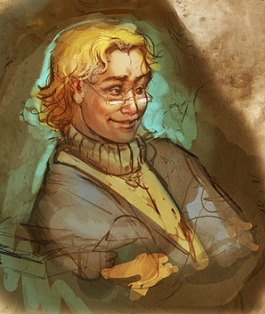
This piece of art has circulated in the fandom for so long I don’t know the original artist and it’s been used for everything from fancovers to perfume. This is where I found it and it’s one of the first things that come up when you google this quote about Aziraphale.
Doesn’t it just feel like this is the man that’s describing, some blonde effeminate gay man? Well guess what, there’s the “blonde as innocence” trope rearing its ugly head again, because the stereotype of gay men and effeminacy as being a white and blonde thing is--ding ding ding you guessed it--racism. And why would intelligent suggest a white and blonde person, except if the stereotype of a dark-skinned person is less intelligent?
Now the point of “people assume Aziraphale is British” is another sticking point people will often use, claiming that the stereotype of a British person is white and blonde. I guess this has some merit, since the British empire was one of the biggest forces behind white colonial expansion, and it seems disingenuous to assign “British” as “nonwhite” as soon as we’re being satirical, in the same way I found it distasteful that the TV show made God female when so many of the criticisms of the church are about its misogyny and lose their teeth as soon as God is no longer male.
However consider that 1.4 million Indian people live in the UK. I heard a man say aloud once that the concept of a black person having a British accent was a little funny, as though Doctor Who doesn’t exist and have black people on it. And I’m not overly familiar with the social landscape of the UK, but I understand they’re experiencing a xenophobia boom and non-white Brits aren’t considered “really British.” The stereotype of non-white people not being British only exists because of reinforcement in media. If you really want to be subversive, drawing Aziraphale as Indian goes way further than drawing him as white IMO.
Now let’s talk about Crowley. He is almost always drawn with a darker skin tone than Aziraphale, even when they are both white, and while I’ve outlined above how this is problematic on terms of linking light skin with innocence, I think it does have an extra layer. I think it also has to do with the exotification and fetishization of brown skin and non-white people.
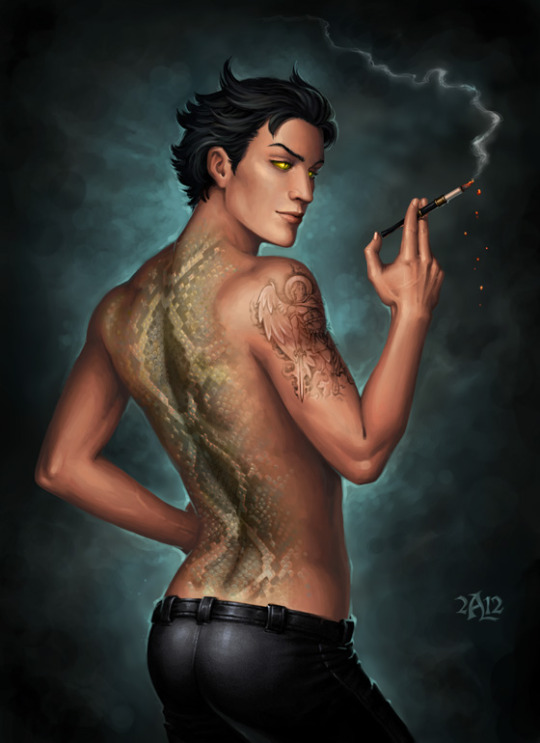
This artist’s tumblr is gone now but their art is still on dA and while it’s definitely beautiful and well-done, I think this is a very good example of what I’m talking about.
Crowley and Aziraphale necessarily contrast each other, so describing Aziraphale as “British” might suggest that Crowley is “foreign-looking.” I also know *ahem* that the fandom generally thirsts over Crowley to hell and back, so making him a swarthy, tall dark and handsome is not necessarily surprising.
An interesting thing happened when the TV show came out, and everyone started drawing Michael Sheen!Aziraphale and David Tennant!Crowley more and more often: It’s not ubiquitous, but it does happen that sometimes artists will draw David Tennant’s skin darker than it actually is. The subconscious urge to see Crowley with dark skin is for some reason that strong for many people. And I really encourage people doing this to think about why. Not naming any names but I’ve working with fanartists before for collabs who I had to ask to lighten “bad guy” demon’s skin tones because it looked like they were making the skin darker on purpose to make them look scarier. This person is a perfectly pleasant person who tries not to be racist! And we both still fell into it accidentally, and it took me a while to notice and point it out, because the ingrained stigmatization of darker skin is pervasive yet often goes unnoticed.
What is the solution? I don’t know, and as a white person I’m not really qualified to make that call. Do we draw them both with the exact same skin tone? Is it better to make them both white? Should we make both of them non-white? Should we only make Aziraphale non-white? I am consciously aware of the fact that the Good Omens fandom is mostly white people, so most of the art we make is being both made by and consumed by white people, so I don’t feel comfortable saying “draw these characters of color specifically” because that can also veer into fetishization territory very quickly. This is not specific to good omens but I think we should pay attention to what fans of color say in all fandom spaces and weigh our choices even if they seem insignificant. And it’s important to realize that fans of color will not be a monolith in their opinion either, and it’s our responsibility to recognize that everyone can be affected by racism and social issues differently, the same way all women are affected by misogyny differently so just because one woman says such as such is misogynistic and another says it’s not. I’m sure there are non-white fans who think it’s perfectly fine to draw Aziraphale as white and Crowley as ambiguously non-white. I’m not saying they’re wrong. And I’m not saying you can’t reblog this kind of art, or that people who make or made it should feel bad about themselves. But so often this sort of thing goes unaddressed just because people don’t like thinking about it, and well, avoiding hard questions never really goes well I think.
195 notes
·
View notes
Text
ESSAY: Berserk's Journey of Acceptance Over 30 Years of Fandom
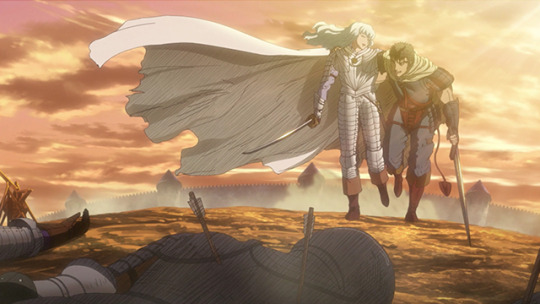
My descent into anime fandom began in the '90s, and just as watching Neon Genesis Evangelion caused my first revelation that cartoons could be art, reading Berserk gave me the same realization about comics. The news of Kentaro Miura’s death, who passed on May 6, has been emotionally complicated for me, as it's the first time a celebrity's death has hit truly close to home. In addition to being the lynchpin for several important personal revelations, Berserk is one of the longest-lasting works I’ve followed and that I must suddenly bid farewell to after existing alongside it for two-thirds of my life.
Berserk is a monolith not only for anime and manga, but also fantasy literature, video games, you name it. It might be one of the single most influential works of the ‘80s — on a level similar to Blade Runner — to a degree where it’s difficult to imagine what the world might look like without it, and the generations of creators the series inspired.
Although not the first, Guts is the prototypical large sword anime boy: Final Fantasy VII's Cloud Strife, Siegfried/Nightmare from Soulcalibur, and Black Clover's Asta are all links in the same chain, with other series like Dark Souls and Claymore taking clear inspiration from Berserk. But even deeper than that, the three-character dynamic between Guts, Griffith, and Casca, the monster designs, the grotesque violence, Miura’s image of hell — all of them can be spotted in countless pieces of media across the globe.
Despite this, it just doesn’t seem like people talk about it very much. For over 20 years, Berserk has stood among the critical pantheon for both anime and manga, but it doesn’t spur conversations in the same way as Neon Genesis Evangelion, Akira, or Dragon Ball Z still do today. Its graphic depictions certainly represent a barrier to entry much higher than even the aforementioned company.
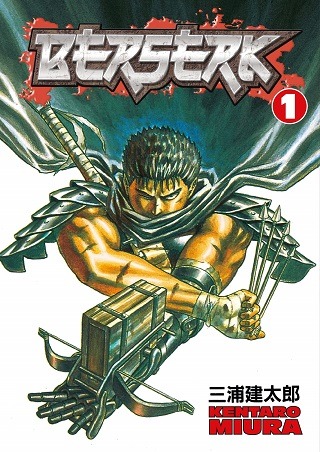
Seeing the internet exude sympathy and fond reminiscing about Berserk was immensely validating and has been my single most therapeutic experience online. Moreso, it reminded me that the fans have always been there. And even looking into it, Berserk is the single best-selling property in the 35-year history of Dark Horse. My feeling is that Berserk just has something about it that reaches deep into you and gets stuck there.
I recall introducing one of my housemates to Berserk a few years ago — a person with all the intelligence and personal drive to both work on cancer research at Stanford while pursuing his own MD and maintaining a level of physical fitness that was frankly unreasonable for the hours that he kept. He was NOT in any way analytical about the media he consumed, but watching him sitting on the floor turning all his considerable willpower and intellect toward delivering an off-the-cuff treatise on how Berserk had so deeply touched him was a sight in itself to behold. His thoughts on the series' portrayal of sex as fundamentally violent leading up to Guts and Casca’s first moment of intimacy in the Golden Age movies was one of the most beautiful sentiments I’d ever heard in reaction to a piece of fiction.
I don’t think I’d ever heard him provide anything but a surface-level take on a piece of media before or since. He was a pretty forthright guy, but the way he just cut into himself and let his feelings pour out onto the floor left me awestruck. The process of reading Berserk can strike emotional chords within you that are tough to untangle. I’ve been writing analysis and experiential pieces related to anime and manga for almost ten years — and interacting with Berserk’s world for almost 30 years — and writing may just be yet another attempt for me to pull my own twisted-up feelings about it apart.
Berserk is one of the most deeply personal works I’ve ever read, both for myself and in my perception of Miura's works. The series' transformation in the past 30 years artistically and thematically is so singular it's difficult to find another work that comes close. The author of Hajime no Ippo, who was among the first to see Berserk as Miura presented him with some early drafts working as his assistant, claimed that the design for Guts and Puck had come from a mess of ideas Miura had been working on since his early school days.
写真は三浦建太郎君が寄稿してくれた鷹村です。 今かなり感傷的になっています。 思い出話をさせて下さい。 僕が初めての週刊連載でスタッフが一人もいなくて困っていたら手伝いにきてくれました。 彼が18で僕が19です。 某大学の芸術学部の学生で講義明けにスケッチブックを片手に来てくれました。 pic.twitter.com/hT1JCWBTKu
— 森川ジョージ (@WANPOWANWAN) May 20, 2021
Miura claimed two of his big influences were Go Nagai’s Violence Jack and Tetsuo Hara and Buronson’s Fist of the North Star. Miura wears these influences on his sleeve, discovering the early concepts that had percolated in his mind just felt right. The beginning of Berserk, despite its amazing visual power, feels like it sprang from a very juvenile concept: Guts is a hypermasculine lone traveler breaking his body against nightmarish creatures in his single-minded pursuit of revenge, rigidly independent and distrustful of others due to his dark past.
Uncompromising, rugged, independent, a really big sword ... Guts is a romantic ideal of masculinity on a quest to personally serve justice against the one who wronged him. Almost nefarious in the manner in which his character checked these boxes, especially when it came to his grim stoicism, unblinkingly facing his struggle against literal cosmic forces. Never doubting himself, never trusting others, never weeping for what he had lost.
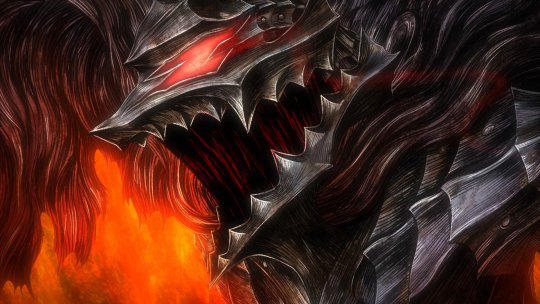
Miura said he sketched out most of the backstory when the manga began publication, so I have to assume the larger strokes of the Golden Arc were pretty well figured out from the outset, but I’m less sure if he had fully realized where he wanted to take the story to where we are now. After the introductory mini-arcs of demon-slaying, Berserk encounters Griffith and the story draws us back to a massive flashback arc. We see the same Guts living as a lone mercenary who Griffith persuades to join the Band of the Hawk to help realize his ambitions of rising above the circumstances of his birth to join the nobility.
We discover the horrific abuses of Guts’ adoptive father and eventually learn that Guts, Griffith, and Casca are all victims of sexual violence. The story develops into a sprawling semi-historical epic featuring politics and war, but the real narrative is in the growing companionship between Guts and the members of the band. Directionless and traumatized by his childhood, Guts slowly finds a purpose helping Griffith realize his dream and the courage to allow others to grow close to him.
Miura mentioned that many Band of the Hawk members were based on his early friend groups. Although he was always sparse with details about his personal life, he has spoken about how many of them referred to themselves as aspiring manga authors and how he felt an intense sense of competition, admitting that among them he may have been the only one seriously working toward that goal, desperately keeping ahead in his perceived race against them. It’s intriguing thinking about how much of this angst may have made it to the pages, as it's almost impossible not to imagine Miura put quite a bit of himself in Guts.
Perhaps this is why it feels so real and makes The Eclipse — the quintessential anime betrayal at the hands of Griffith — all the more heartbreaking. The raw violence and macabre imagery certainly helped. While Miura owed Hellraiser’s Cenobites much in the designs of the God Hand, his macabre portrayal of the Band of the Hawk’s eradication within the literal bowels of hell, the massive hand, the black sun, the Skull Knight, and even Miura’s page compositions have been endlessly referenced, copied, and outright plagiarized since.
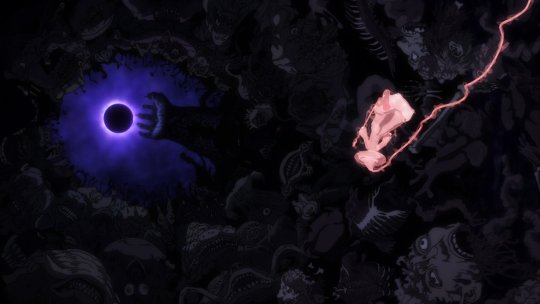
The events were tragic in any context and I have heard many deeply personal experiences others drew from The Eclipse sympathizing with Guts, Casca, or even Griffith’s spiral driven by his perceived rejection by Guts. Mine were most closely aligned with the tragedy of Guts having overcome such painful circumstances to not only reject his own self enforced solitude, but to fearlessly express his affection for his loved ones.
The Golden Age was a methodical destruction of Guts’ self-destructive methods of preservation ruined in a single selfish act by his most trusted friend, leaving him once again alone and afraid of growing close to those around him. It ripped the romance of Guts’ mission and eventually took the story down a course I never expected. Berserk wasn’t a story of revenge but one of recovery.
Guess that’s enough beating around the bush, as I should talk about how this shift affected me personally. When I was young, when I began reading Berserk I found Guts’ unflagging stoicism to be really cool, not just aesthetically but in how I understood guys were supposed to be. I was slow to make friends during school and my rapidly gentrifying neighborhood had my friends' parents moving away faster than I could find new ones. At some point I think I became too afraid of putting myself out there anymore, risking rejection when even acceptance was so fleeting. It began to feel easier just to resign myself to solitude and pretend my circumstances were beyond my own power to correct.
Unfortunately, I became the stereotypical kid who ate alone during lunch break. Under the invisible expectations demanding I not display weakness, my loneliness was compounded by shame for feeling loneliness. My only recourse was to reveal none of those feelings and pretend the whole thing didn't bother me at all. Needless to say my attempts to cope probably fooled no one and only made things even worse, but I really didn’t know of any better way to handle my situation. I felt bad, I felt even worse about feeling bad and had been provided with zero tools to cope, much less even admit that I had a problem at all.
The arcs following the Golden Age completely changed my perspective. Guts had tragically, yet understandably, cut himself off from others to save himself from experiencing that trauma again and, in effect, denied himself any opportunity to allow himself to be happy again. As he began to meet other characters that attached themselves to him, between Rickert and Erica spending months waiting worried for his return, and even the slimmest hope to rescuing Casca began to seed itself into the story, I could only see Guts as a fool pursuing a grim and hopeless task rather than appreciating everything that he had managed to hold onto.
The same attributes that made Guts so compelling in the opening chapters were revealed as his true enemy. Griffith had committed an unforgivable act but Guts’ journey for revenge was one of self-inflicted pain and fear. The romanticism was gone.
Farnese’s inclusion in the Conviction arc was a revelation. Among the many brilliant aspects of her character, I identified with her simply for how she acted as a stand-in for myself as the reader: Plagued by self-doubt and fear, desperate to maintain her own stoic and uncompromising image, and resentful of her place in the world. She sees Guts’ fearlessness in the face of cosmic horror and believes she might be able to learn his confidence.

But in following Guts, Farnese instead finds a teacher in Casca. In taking care of her, Farnese develops a connection and is able to experience genuine sympathy that develops into a sense of responsibility. Caring for Casca allows Farnese to develop the courage she was lacking not out of reckless self-abandon but compassion.
I can’t exactly credit Berserk with turning my life around, but I feel that it genuinely helped crystallize within me a sense of growing doubts about my maladjusted high school days. My growing awareness of Guts' undeniable role in his own suffering forced me to admit my own role in mine and created a determination to take action to fix it rather than pretending enough stoicism might actually result in some sort of solution.
I visited the Berserk subreddit from time to time and always enjoyed the group's penchant for referring to all the members of the board as “fellow strugglers,” owing both to Skull Knight’s label for Guts and their own tongue-in-cheek humor at waiting through extended hiatuses. Only in retrospect did it feel truly fitting to me. Trying to avoid the pitfalls of Guts’ path is a constant struggle. Today I’m blessed with many good friends but still feel primal pangs of fear holding me back nearly every time I meet someone, the idea of telling others how much they mean to me or even sharing my thoughts and feelings about something I care about deeply as if each action will expose me to attack.
It’s taken time to pull myself away from the behaviors that were so deeply ingrained and it’s a journey where I’m not sure the work will ever be truly done, but witnessing Guts’ own slow progress has been a constant source of reassurance. My sense of admiration for Miura’s epic tale of a man allowing himself to let go after suffering such devastating circumstances brought my own humble problems and their way out into focus.
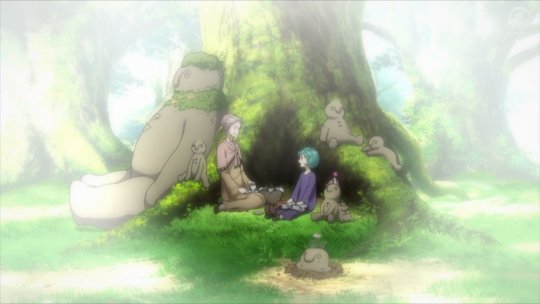
Over the years I, and many others, have been forced to come to terms with the fact that Berserk would likely never finish. The pattern of long, unexplained hiatuses and the solemn recognition that any of them could be the last is a familiar one. The double-edged sword of manga largely being works created by a single individual is that there is rarely anyone in a position to pick up the torch when the creator calls it quits. Takehiko Inoue’s Vagabond, Ai Yazawa’s Nana, and likely Yoshihiro Togashi’s Hunter X Hunter all frozen in indefinite hiatus, the publishers respectfully holding the door open should the creators ever decide to return, leaving it in a liminal space with no sense of conclusion for the fans except what we can make for ourselves.
The reason for Miura’s hiatuses was unclear. Fans liked to joke that he would take long breaks to play The Idolmaster, but Miura was also infamous for taking “breaks” spent minutely illustrating panels to his exacting artistic standard, creating a tumultuous release schedule during the wars featuring thousands of tiny soldiers all dressed in period-appropriate armor. If his health was becoming an issue, it’s uncommon that news would be shared with fans for most authors, much less one as private as Miura.
Even without delays, the story Miura was building just seemed to be getting too big. The scale continued to grow, his narrative ambition swelling even faster after 20 years of publication, the depth and breadth of his universe constantly expanding. The fan-dubbed “Millennium Falcon Arc” was massive, changing the landscape of Berserk from a low fantasy plagued by roaming demons to a high fantasy where godlike beings of sanity-defying size battled for control of the world. How could Guts even meet Griffith again? What might Casca want to do when her sanity returned? What are the origins of the Skull Knight? And would he do battle with the God Hand? There was too much left to happen and Miura’s art only grew more and more elaborate. It would take decades to resolve all this.
But it didn’t need to. I imagine we’ll never get a precise picture of the final years of Miura’s life leading up to his tragic passing. In the final chapters he released, it felt as if he had directed the story to some conclusion. The unfinished Fantasia arc finds Guts and his newfound band finding a way to finally restore Casca’s sanity and — although there is still unmistakably a boundary separating them — both seem resolute in finding a way to mend their shared wounds together.
One of the final chapters features Guts drinking around the campfire with the two other men of his group, Serpico and Roderick, as he entrusts the recovery of Casca to Schierke and Farnese. It's a scene that, in the original Band of the Hawk, would have found Guts brooding as his fellows engage in bluster. The tone of this conversation, however, is completely different. The three commiserate over how much has changed and the strength each has found in the companionship of the others. After everything that has happened, Guts declares that he is grateful.
The suicidal dedication to his quest for vengeance and dispassionate pragmatism that defined Guts in the earliest chapters is gone. Although they first appeared to be a source of strength as the Black Swordsman, he has learned that they rose from the fear of losing his friends again, from letting others close enough to harm him, and from having no other purpose without others. Whether or not Guts and Griffith were to ever meet again, Guts has rediscovered the strength to no longer carry his burdens alone.
All that has happened is all there will ever be. We too must be grateful.
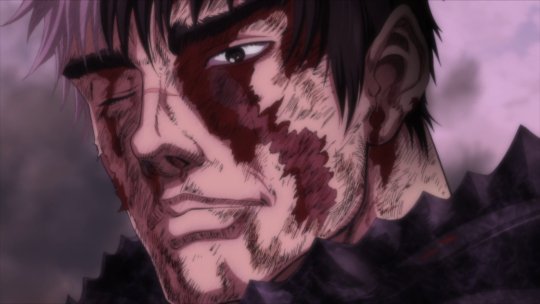
Peter Fobian is an Associate Manager of Social Video at Crunchyroll, writer for Anime Academy and Anime in America, and an editor at Anime Feminist. You can follow him on Twitter @PeterFobian.
By: Peter Fobian
4 notes
·
View notes
Photo
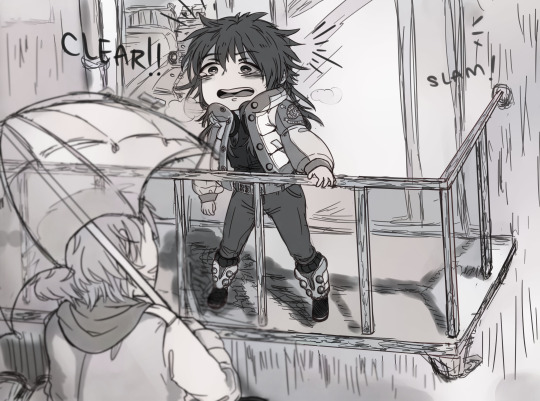
“I heard your voice, so I came... Aoba-san.”
Hooo-boy, if that doesn’t get me emotional every single time. Call it my bias for eccentric bundles of sunshine and softness, or my crippling weakness for the secretly-handsome-and-devastatingly-earnest type, but you can’t change my mind: Clear is, hands down, DMMD’s best love interest. Character development-wise, thematically, romantically, he nails every trial thrown at him, gets his man, and proceeds to break your heart in the tenderest, sincerest way possible. I am hopping with Huge Fan Energy, so this post is gonna be unapologetically long and self-indulgent and grossly enthusiastic. Yeeeee.
————
Look, DMMD meta analysis has been done to death, I get it. This game is old. But I think it stands as testament to its excellent production that it’s still a game worth revisiting years later — especially during these times when social contact is so hard pressed to come by and we all rabidly devour digital media like a horde of screeching feral gremlins. (Have you seen Netflix’s stock value now? The exploding MMO server populations? Astonishing.) It’s pure, simple human nature to want to connect, to cling to members of our network out of biological imperative and our psychological dependency on each other. As cold and primitive at that sounds, social contact also fulfills us on a higher level: the community is always stronger than the individual; genuine trust begets a mutually supportive relationship of exchange and evolution. People learn from each other, and grow into stronger, wiser, better versions of themselves.
Yeah, I’m being deliberately obtuse about this. Of course I’m talking about Clear. Clear, who is a robot. Clear, who is nearly childlike in his insatiable curiosity regarding the human condition.
And it’s a classic literary tactic, using non-human entities to question the intangible constructs of a concept like ‘humanity’ — think Frankenstein, or Tokyo Ghoul, or Detroit: Become Human, among so, so many works in various media — all tackling that question from countless angles, all with varying measures of success. What does it mean to be human? To be good? Who are we, and where do we stand in the grand scheme of things? Is there even a scheme to follow? … Wait, what?
Jokes aside, there are so many ways that the whole approaching-human-yet-not-quite-there schtick can be abused into edgy, joyless existential griping. Nothing wrong with that if it’s what you’re looking for, except that we’re talking about a boys’ love game here. But DMMD neatly, sweetly side steps that particular wrinkle, giving us a wonderfully grounded character to work with as a result.
Character Design — a see-through secret
Let’s start small: Clear’s design and premise. Unlike so many other lost, clueless robo-lambs across media, Clear does have a small guiding presence early on in his life. It takes the form of his grandfather, who teaches Clear about the world while also sheltering him from his origins. It means he learns enough to blend sufficiently into society; it also means that Clear has even more questions that sprout from his limited understanding of the world.
Told that he must never remove his mask lest he expose his identity as a non-human, Clear’s perpetual fear of rejection for what he is drives much of his eccentricity and challenges him throughout much of his route. As for the player, the mystery of what lies underneath his mask is a carrot that the writers get to dangle until the peak moment of emotional payoff. Even if it’s not hard to guess that there’s probably a hottie of legendary proportions stuck under there, there’s still significance in waiting for that good moment to happen. And when it does, it feels great.
His upbringing contextualizes and affirms his odd choice of fashion: deliberately generic, bashfully covered from the public eye, and colored nearly in pure white - the quintessential signal of a blank slate, of innocence. Contrasted with the rest of DMMD’s flashy, colorful crew, Clear is probably the most difficult to read on a superficial scale, not falling into the fiery, bare-chest sex appeal of a womanizer, or the techno-nerd rebel aesthetic that Noiz somehow rocks. Goofy weirdo? Possibly a serial killer? Honestly, both seem plausible at the start.
And that’s the funny thing, because as damn hard as he tries to physically cover himself up from society, Clear is irrepressibly true to his name: transparent to a fault. He’s a walking, talking contradiction, and it’s not hard to realize that this mysterious, masked stranger… is really just an open book. By far the most effusive and straightforward of the entire cast, his actions are wildly unconventional and sometimes wholly inexplicable. But given time to explain himself, he is always, always sincere in his intentions — and unlike the rest of the love interests, naturally inclined to offer bits of himself to Aoba. It doesn’t take the entire character arc to figure out his big, bad secret — our main character gets an inkling about halfway through his route — and what’s even better is that he embraces it, understanding that his abilities also allow him to protect what he cherishes: Aoba.
So what if he doesn’t fit into an easily recognizable box of daydream boyfriend material? He’s contradictory, and contradiction is interesting. Dons a gas mask, but isn’t an edgelord. Blandly dressed, but ridiculously charming. Unreadable and modestly intimidating — until he opens his mouth. Even without the benefit of traversing his route, there’s already so much good stuff to work with, and sure as hell, you’re kept guessing all the way to the end.
Character Development — from reckless devotion into complaisant subservience, complaisant subservience into mutual understanding. And then, of course: free will, and true love.
At its core, DMMD is about a dude with magic mind-melding powers and his merry band of attractive men with — surprise! — crippling emotional baggage. Each route follows the same pattern, simply remixing the individual character interactions and the pace of the program: Aoba finds himself isolated with the love interest, faces various communication issues varying on the scale of frustrating to downright dangerous, wanders into a sketchy section of Platinum Jail, bonds with the love interest over shared duress, breaks into the Oval Tower, faces mental assault by the big bad — and finally, finally, destroys those internal demons plaguing the love interest, releasing the couple onto the path of a real heart-to-heart conversation. And then, you know, the lovey-dovey stuff.
Here’s the thing: as far as romantic progression goes, it’s really not a bad structure. There’s room to bump heads, but also to bond. The Scrap scene is a thematically cohesive and clever way to squeeze in the full breadth of character backstory while simultaneously advancing the plot. In this part, Aoba must become the hero to each of his love interests and save them from themselves. Having become privy to each other’s deepest thoughts and reaching a mutual understanding of each other, their feelings afterwards slide much more naturally into romantic territory. They break free of Oval Tower, make their way home, and have hot, emotionally fulfilling sex or otherwise some variation on the last few steps. The end.
That is, except for Clear.
Clear’s route is refreshing in that he needs none of these things — the climax of his emotional arc actually comes a little after the halfway point of his route. When Clear’s true origins are revealed, he comes entirely clean to Aoba, fighting against his fear of rejection but also trusting that Aoba will listen. It’s a quiet, vulnerable moment, rather than the action-packed tension we normally experience during a Scrap scene.
That doesn’t mean it’s prematurely written in — it simply means that he reaches his potential faster than the other characters. Because of that, he’s free to pursue the next level of his route’s development much, much sooner in the timeline: he overcomes his fears of his appearance, he confesses his love to Aoba, he leaves the confines of a largely dubious master-servant relationship and allows himself to be Aoba’s equal. Clear’s sprite art mirrors his emotional transformation all the way through, exposing him to the literal bone — and Aoba’s affection for him doesn’t change a single bit. Beautiful.
The whammy of incredible moments doesn’t just stop there, though. I don’t exactly recall the order the routes DMMD is ideally meant to be played in, but I believe Clear’s is meant to be last. And if you do, I can guarantee that it becomes a hugely delightful gameplay experience — in order to achieve his good ending, you must do absolutely nothing with Scrap. It doesn’t just subvert our player expectations of proactively clicking and interacting with our love interests; it grabs the story by its thematic reins and yanks it all back to the forefront of our scene.
In every route besides Clear’s, Scrap is a tool used to insert Aoba’s influence into and interfere with his target’s mind. Using his powers of destruction, Aoba is able to prune whatever maligned thoughts are harming his target; in any conventional situation, using Scrap is the right choice.
But one of the central problems in Clear’s route is his conflict between the impulses of his conditioning and his desire to live freely as a human would. Breaking free of Toue’s programming is what initially made him unique; growing beyond the rules imposed by his grandfather is what makes him human. In the final conflict scene, Clear’s decision to destroy his key-lock is an action of true autonomy, made with perfect understanding of the consequences and a sincere, selflessly selfish desire to protect someone he loves. In order to receive his good end, you have to respect his decision. It doesn’t matter which option you pick — by using Scrap, Aoba turns his back on every positive choice he made with Clear and attempts to exert his authority over him. This is Aoba becoming Toue; this is Aoba trying to reinstate himself as ‘Master’ right as he approved Clear as his equal. That’s blatant hypocrisy, and it doesn’t matter if Aoba is trying to do it for Clear’s ‘own good’ — that’s not Aoba’s call to make. If you truly wish to respect Clear’s free will, you will stand by. This is the truth of the moment: Clear has no emotional blockages that Aoba needs to fix. Believe in him, just as he believed in you.
The path to his heart is, and always has been, clear. Scrap was never needed from the start.
While Aoba might be the main character, Clear is undeniably a hero in his own route just as much. Tirelessly earnest and always curious, he leaps headlong into the unknown and emerges with his newfound enlightenment. He’s unafraid of weathering trials, even to the point of accepting death, and returns anew from oblivion to a sweet, cathartic ending. That’s about as textbook hero’s journey as it gets — if that doesn’t make him unquestionably, certifiably, unconditionally human, then I will scream.
And only finally… there is the free end. The final CG is like a throwback to our first impression of him: indistinct, purposefully obscured from proper view. But this time, we know better — and so does Aoba. Looks were never what mattered in Clear’s route. If you were patient, and you were open-minded, and you listened… well, what we realize now is that Clear was doing the exact same thing for you, too.
From a carefree, aimless robot-man with only the gimmick of “eccentric ditz” to carry him forward, we get a supremely more interesting character by the end: a man who has graduated from the well-intentioned but claustrophobic conditioning of his childhood; a weapon who has defied the imperatives placed on him by his creator’s programming; a wanderer who has, through unconditional patience and empathy, discovered love, and striven to become a better person for it. Who was it that ever doubted Clear’s character? He’s the goddamn goodest boy that ever wanted to be a real boy. Of course Clear is human. And in fact, he does it better than every single one of the actually human love interests. You can’t change my mind.
The Romance — kindness is really fucking attractive, okay.
Like I’ve said earlier, I have my Big Fan Blinds stuck on pretty tight. I might be conjuring sparks from thin air. But I think every choice was a deliberate creative decision on the writers’ part, and they deserve all the kudos for it — I’m just the lucky player who gets to enjoy it. But aside from Noiz (who I also think is a perfect darling as well — I could go on and on about him), Clear’s route is a model example for consent and healthy relationships in VN storytelling. This is reciprocated on both sides: never does Aoba infringe on Clear’s boundaries, and neither does Clear. They’re sensitive to each other’s needs and concerns; they ask for permission and stop when it isn’t granted (and when it is, boy do they get frisky — I’m not complaining!) I don’t need to say much more, because I think that consent is both fantastic and yes, incredibly hot (the scene in DMMD is tons more sad, go play Re:connect!). Good writing shows off the massive erotic potential enthusiastic consent puts into intimacy, and Aoba’s and Clear’s relationship is honestly a dream playground. The point is, I think Aoba and Clear genuinely do find equal balance in their relationship by the end of his route (and certainly through Re:connect). If you follow through Re:connect’s storyline, there’s even more thematic richness that comes through in the form of Clear’s greatest asset: communication. The couple get to discuss the long-term implications of them being together; they both offer concerns, points, and assurances to the other, and it’s just a soft, honest moment not so unlike the worries of a real relationship. Hearing is kind of Clear’s motif sense, but it’s really great to see that Aoba also subtly picks it up, really flexes his own communication skills to better engage with Clear.
Point is, Clear’s route spoke to me on a lot of little levels. Design-wise, he’s already got a ton going for him, and his story builds upon it rather than against it, enriching his development and grounding him a little more solidly in the DMMD universe (and in my heart). His route, aside from being emotionally ruinous, carries a pretty solid chunk of world-building (only beaten out by Mink’s and Ren’s, probably), and the romance feels organic, healthy, and realistic. He’s not the only one with an excellent route, but he’s my favorite. If you read through all of this, you’re a real trooper and I’m extremely impressed. Thanks for tuning in. Peace.
#dramatical murder#dmmd#aoba seragaki#clear#dmmd clear#long ass emotional screeching#lOL I FORGOT TO DRAW IN THE UMBRELLA HANDLE ahA#fixed
90 notes
·
View notes
Note
Do you have any thoughts on why the novel might be so popular among lgbt people despite (sometimes quite obviously) being written by a straight women for straight women. I think this is quite evident in for example the sex scenes
Why do I think the novel is so popular amongst LGBTQ+ people despite being written by a straight woman for straight women? Simple! It’s a good story and the characters are complex and intriguing. No piece of media is ever perfect, so it simply comes down to whether an individual feels the positive aspects of the media outweigh the negative aspects of the media. Are there problematic aspects within the novel? Of course! But that doesn’t mean the novel as a whole should be disregarded. You can consume media while still being critical of it, just like you can like a character while acknowledging that they’re not a good person. LGBTQ+ people, like everyone else, value a good story and interesting characters, so even if there are aspects of the story that we dislike, we may still stick around if we think it’s worth it! Also, I think there’s a shortage of stories like “Mo Dao Zu Shi” where you have LGBTQ+ characters whose sexuality isn’t the focus of the story. Yes, Wangxian are soulmates and very much in love, but that isn’t the whole point. You have a delightful bundle of politics, magic, familial ties, concepts of right and wrong, mystery, etc etc that also features a beautiful love story between two men. I guess my point is, LGBTQ+ people are flawed just like everyone else and sometimes we consume content even if we don’t agree with every part of it.
I’ve avoided getting involved in any discourse surrounding the various versions of MDZS because I wanted to keep this blog drama free, however I would like to take this chance to offer my own thoughts on the “problematic” aspects of the novel. Before I get into it, I just want to make three things clear: 1) I’m white, 2) I’m not mlm, I’m a lesbian, and 3) I’ve only read the second half of the novel and honestly I can’t remember too much of the specifics. The relevance of my opinion on the matter, therefore, is limited and my words should be read with this fact in mind. I would love to hear everyone’s thoughts and feelings on this matter, so do feel free to either leave a comment or reblog and add your two-cents. All I ask is that we keep it respectful so this can continue to be an enjoyable space for all fans.
I’ve been going through the untamed’s tumblr tag daily since the start of this blog in August 2019, so I’ve seen the whole spectrum of opinions on this matter. Some people feel very strongly that some of the ways in which MXTX writes particular aspects of the novel are “problematic,” some people are indifferent, and others feel that criticism of MXTX’s writing comes from a lack of knowledge of Chinese culture (particularly LGBTQ+ Chinese culture). (I remember seeing a post touching upon this last matter, but I didn’t save it, so unfortunately I can’t link it.)
I think the two most common criticisms of the novel that I have come across pertain to matters of consent and the imposing of heteronormative concepts onto Wangxian. Again, I want to stress that I haven’t read the novel in its entirety and my memory of it is foggy. Talking about consent first, some felt the scene in the novel where LWJ kisses an unexpecting blindfolded WWX was a big no no, while others thought it was a very sweet, romantic scene. (To give context for those who have only seen the drama, this scene would have been placed in episode 25 had they included it). For this matter, I’m of the belief that consent is a must. Regardless of whether WWX enjoyed the kiss, the fact stands that no one is entitled to another’s body, and this is why consent is, in my eyes, non-negotiable. For those who have no problem with this scene, I do think it is worth considering how you would feel about this scene had it involved, say, Jin Zixuan kissing a blindfolded Jiang Yanli. If that had been the case, I do think the majority of readers would have found the scene in poor taste (I could be wrong, though!). I will say that the trope of the forceful kiss is extremely common and can be found in every genre; it’s definitely not restricted to LGBTQ+ couples. For the aforementioned reason, I don’t like the forceful kiss scenario irregardless of the genders of the people involved. I do think writing such scenes for LGBTQ+ couples in particular can perpetuate harmful stereotypes, particularly that LGBTQ+ people have no respect for personal boundaries and can’t control their physical desires. I think the situation is doubly bad if the person who is being kissed is “not yet gay,” because again, it perpetuates the idea of the big bad gay person and the innocent “straight” person who is at the whims of said big bad gay.
Moving on to WWX and LWJ’s sex life, I have seen multiple people in the tag mentioning WWX having a “rape kink” and their discomfort with this fact. Logically, I understand that we are all allowed, as human beings with different tastes and preferences, to enjoy the things that bring us pleasure (excluding certain obvious things). That being said, I do not personally enjoy rape fantasies in my media and try to stay far away from it. As I mentioned, we are all welcome to our own tastes and preferences, but I do think it is important that we realize that we are all also the product of our environments. Things, including kinks, do not exist in vacuums, and therefore they must arise as a result of some mixture of external and internal forces. Does MXTX giving WWX a rape kink automatically make her demon spawn? Not really. Does MXTX giving WWX a rape kink add anything to his character or the story? Also not really. All this being said, I do think LGBTQ+ media is oversaturated with consent issues and I’d personally like to see this come to an end, because once again, it perpetuates harmful stereotypes that do have a real impact on LGBTQ+ individuals.
As for the imposing of heteronormative concepts onto Wangxian, I think the biggest complaint I’ve seen is about WWX being referred to as the “mom” or the “wife” within the Wangxian couple. I would like to state here that this may be a situation in which cultural differences come into play. Additionally, because the novel is not originally written in English, it may be a case of telephone in which the true meaning becomes distorted as it is translated from one language to another and then to another and so on and so forth. Therefore, I am going to proceed with my thoughts on the matter in a more generalized way. For me, this is a big pet peeve of mine, to the point where I will not reblog content that refers to any of the male characters as “mom” or “wife.” My reasoning is simple: WWX is a man, so he would be someone’s “dad” or “husband,” not their “mom” or “wife.” I know from first-hand experience that non-LGBTQ+ people will often try to place a gay couple within a heterosexual context to make it easier for them to process how two women or two men could be together. I understand the reasoning behind this way of thinking, but that does not mean this way of thinking should be encouraged. It’s bad enough that non-LGBTQ+ couples are ensnared in an endless maze of gendered ways of being and thinking - let’s not force that on LGBTQ+ couples as well. My other issue is that the words “mom” and “wife” not only have gendered connotations, but they have implicit sexual connotations as well. In this context, “mom” and “wife” are just another way of saying “bottom.” Just think about it; nobody’s out there calling LWJ “mom” or “wife.” The whole idea of “top” and “bottom” in gay media is so……..it’s almost like an obsession? And for those of you who may be thinking it’s not that deep and has no bearing on real life….I really wish that were true. Go look at the comments section of any gay couple’s youtube video and you will invariably find someone asking who is the top and who is the bottom. That’s invasive as fuck, y’all, and you don’t see that shit on straight couple’s videos (again, because the assumption is that women are always in the submissive, therefore there’s no need to ask because it’s assumed the answer will always be that the woman “bottoms” and the man “tops”). All this being said, I can only speak about this matter from my viewpoint as a lesbian. If one day I were to get married, I wouldn’t want people referring to my wife as my “husband,” because the whole point is that we’re both the wife! I know there isn’t one rule/mindset that applies to all gay people, so I would love to hear others’ feelings on this matter.
Finally, I would also like to briefly touch upon Mo Xuanyu, who we don’t really get to see in the drama. I don’t know whether LWJ or WWX ever explicitly state their sexualities or which gender(s) they’re attracted to, but I’m pretty sure Mo Xuanyu is explicitly stated to be strictly into men (please correct me if I’m wrong!). I do wonder what MXTX’s intentions were (if there were any) when she decided to make Mo Xuanyu gay, because what I’ve grasped of his characterization is that he is written similarly to other gay male characters that give the impression they were created by checking off a list of every popular stereotype about gay men. I guess I’m just curious, as someone who knows very little about Mo Xuanyu, how others felt about his character in terms of complexity and stereotypes.
If you took the time to read all this, thank you! Let me know your thoughts~
#the untamed#mo dao zu shi#cql#mo xiang tong xiu#mxtx#long post#sorry this took me a while to respond to anon#i was away from home and also i knew it would end up being long so i wanted to have the time to properly answer you#ask#anon#Anonymous
98 notes
·
View notes
Text
Good Sources of Supernatural Information
Hello everyone! I know many people in the community may be wondering where they can find supernatural information that is unbiased or logical in nature, and how to discern claims made in the community. It’s not too hard, once you know where to look.
Books! Not any books, mind you, but books focused on the supernatural from a non-fiction perspective. Books about different spiritual beings, books about different religious and cultural practices, and books about the supernatural and different mythical beings. You can analyze them and learn more about the supernatural world (or at least part of it) that way. In lieu of physical books you can use websites and online articles, but you need to take some of them with a grain of salt, and sometimes track down the original sources to confirm what they say.
Scientific journals. Sometimes you’re not sure if a claim made in a historical source is truly supernatural or not. Sometimes you’re not really sure if what a person claims now is physically possible. Scientific journals are a great way to figure this out and discern different conditions from other supernatural experiences. Is someone in a history book suffering from clinical lycanthropy or are they actually a werewolf? Is someone claiming to shift into animals that seem to defy physics? Check some scientific journals and see what matches up and what doesn’t.
Experience! Not to say you should run into difficult situations or try and put yourself in harms way, but sometimes you can only understand certain things through real-world experience, or the experiences of others. It’s easier to figure out the differences between demon possession and other conditions when you’ve seen different cases over time. It’s easier to distinguish between roleplayers and genuine supernaturals when you’ve seen them several times. Experience can help and add to the information you have, though it shouldn’t be the sole substitute for other sources of information.
Using these you can get a good idea of how things work regarding the supernatural, and what does or doesn’t make sense.
Similarly, there are poor sources of supernatural info, things that you really cannot count on to tell you too much about the supernatural or spiritual world.
Fictional books or newer forms of media. Not to say that one or two things in a fictional book cannot be right, but generally fiction and fantasy do not have anything to do with reality. You may find that a spiritual concept or species noted in a fictional book or show has a real-life counterpart (ex. Yo-Kai with their yokai being inspired by the actual spirits) but the fictional book will generally not be a source of real-world supernatural info.
Spiritual realm. The spiritual realm can be good for discerning information about the spiritual, but take anything from there with a grain of salt, especially if it refers to the physical world and/or what supernaturals do or don’t exist.
Past life memories. Like the above, they can be good for discerning information on the past, but they shouldn’t be relied on too much. Past life memories can be confabulations, stand-ins for trauma, or be real but just not apply to this world, and are best taken as Unverified Personal Gnosis.
This is not to say using any of those methods make you an awful person, but they cannot be used as good sources for the supernatural or what does or doesn’t exist here. Be careful when using them to understand the supernatural.
Remember to question everything you encounter! Just because something is supernatural does not mean it doesn’t abide by real-world scientific laws, and just because someone is claiming to be supernatural doesn’t mean they’re automatically real, good or a trustworthy person. Use discretion when interacting with others in the supernatural community, and try to think rationally about things in the supernatural.
#proudphysicalshifters#physical shifting#pshifting#realsupernaturalcommunity#realsupernaturals#p-shifting#physical shifters
10 notes
·
View notes
Photo

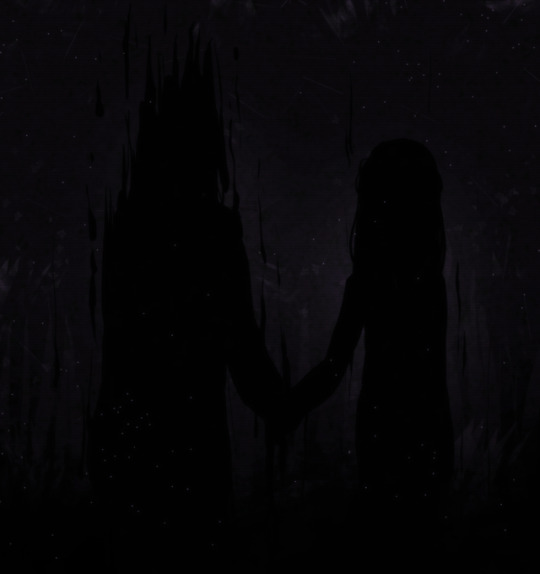
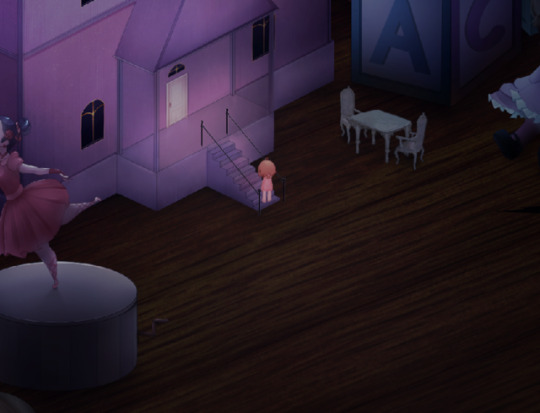

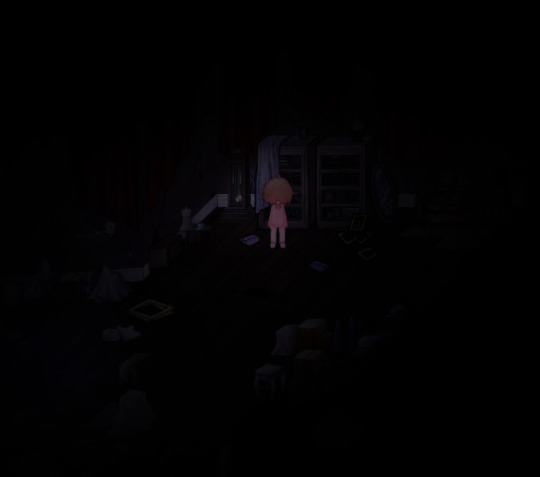
August’s Featured Game: Marinette
DEVELOPER(S): Teal Crown ENGINE: RPG Maker MV GENRE: Horror, Puzzle, Adventure WARNINGS: Sensitive Themes, Blood/Light Gore SUMMARY: A little girl named Marinette, in the wake of a splitting family and a change of homes, is having a birthday. But this, her eleventh birthday, will present a deadly opportunity to fulfill a special promise. On the night before her birthday, she is drawn into a strange realm; an unnatural dollhouse, populated with dolls who are not quite what they seem. A web of strings lying in wait, and threatening to ensnare the poor marionette; warping her perception, and twisting her every move. Will the strings attach, and force her to become an unwilling puppet, or will she escape this surreal web of strings? What will she have to do to avoid the dangers of the dollhouse, and set herself free?
Our Interview With The Dev Team Below The Cut!
Introduce yourself! *Mitty: "Hello, I'm Mitty! Thank you so much for the opportunity to participate in this interview. I'm the main developer of the game and I'm working with a team of friends to make this game a reality. I work mainly on the visuals and programming, and I'll be representing the team, alongside Third! I've been on the community for around two years, even though I tend to not be active very often." *Third: "Hoi, I’m Third! I appreciate you reaching out to interview us. I’m the main composer and writer of Marinette, and I work under Mitty to make the story and soundtrack what we want it to be. I’ve been in the community for little less than Mitt but am even less active in most of my developer discords."

What is your project about? What inspired you to create this game initially? *Mitty: "The game is essentially about a girl that gets trapped inside a dollhouse. A simple concept really can go far ahaha I've always loved themes related to creepy dolls so I wanted to create something related to that. What pushed me initially to start were obviously the inspiration of seeing other devs creating, seeing how far you could go with these engines and create amazing interactive stories, however the huge support from a friend was what made me actually start past the planning and dreaming!" *Third: "Marinette is a story about a little girl becoming entangled in the complicated family and supernatural landscape she finds herself in on her birthday. I enjoy writing short stories about this kind of thing so it’s fantastic to work on a larger project about one of my favorite subjects. My primary inspiration and introduction to this kind of game in general was Pocket Mirror, and I use it the most as a model for how to do certain things. However, I also draw a lot of inspiration from masterpieces like Aria’s Story, Ib, Witch’s House, and Alice Mare."
How long have you been working on your project? *Mitty: "The project has been in the works for around two years now! The first year was mostly planning and right now we are on the right track with the programming and asset creation for the demo, as well as music and sound design for later development. Planning isn't over yet though, especially for the final game." *Third: "I’ve been working on this for almost two years. The soundtrack possessed most of my earlier attention, but now it’s taken a backseat to writing, now that I’m actively writing the scripts for the game now. "
Did any other games or media influence aspects of your project? *Mitty: "Yes! The game has inspirations from plenty of sources, not only strictly RPG Maker Horror games, or games in general for that matter. If I were to mention those, of course games like Ib, The witch's house, Alice Mare, Pocket Mirror, Yume Nikki & .flow, Stray Cat Crossing, Mogeko's games...etc quickly come to mind. When it comes to the aesthetics and visuals, the inspirations come from several different places, including games like Alice Madness Returns, Dofus, Yomawari, The Legend of Mana, Little Nightmares...the list goes on; or other media, like Inu Curry's animation style or video creator nana825763, as well as some anime and music videos. Silent hill is also a huge inspiration for the atmosphere, and hopefully we can pull it off well!" *Third: "My primary inspiration, as I’ve said earlier, is Pocket Mirror, both for its masterful writing and soundtrack. The game’s soundtrack is the main reason I still play piano. Whenever I’m feeling musical, my fingers always hunt out the same kind of haunting, mysterious, and sometimes peaceful and playful melodies that Pocket Mirror is rife with. In the end, our soundtrack is probably going to sound like Pocket Mirror and Aria’s Story’s soundtracks were meshed together. Story wise, commonplace elements in this genre like demons, monsters, mean parents and puzzles that tell the story are commonplace for a reason, and certainly find their way into this one, in their own special way. Every other game I’ve mentioned involves them in some form or another. And young, curious protagonists are also a blast to write and do evil things to and put in difficult, dangerous situations. "

Have you come across any challenges during development? How have you overcome or worked around them? *Mitty: "We surely have! Many of them in different areas ahaha Taking away bug hunting, I am primarily an artist, so programming for me is a secondary thing. Because of this it's easy to get carried away and hard to realise what can and can't be done. I don't want the game to be visually boring if I can make things move and seem alive! The way I'm handling it is programming like an artist: I think in my head what cool things I can do with my art by not having it completely still, and then it's a matter of executing it on the engine. However this comes with a downside. I tend to tweak things a lot, and that takes quite some time, but I honestly think it's worth it ahaha Also I find it hard to start writing, but when I do, I can't stop orz. Other challenges are also finding plot holes. This is fixed with a lot of studying the story, gathering inspiration and talking with the team. I also struggle a bit with communicating with the team, but thankfully they are all very nice and understanding." *Third: "Main challenge is overcoming the sheer weight of how much I have to learn about music and writing in order for this game to be what I want it to be. I’m a perfectionist, and when I care about something, I can’t tolerate it being worse than it could’ve been. Also, writing is getting more and more complicated and there’s more things and details to keep track of so as not to create inconsistencies or plot holes, especially as we try to revise it and make major changes to the story (Mitt will know what I’m talking about). "
Have any aspects of your project changed over time? How does your current project differ from your initial concept? *Mitty: "It changed a lot, not only in terms of the story and writing, but visually too. The basic concept is close to being the same, though. You can check out old posts in the blog where I consider different styles of mapping and such. Actually, don't, please. It's too old...and my writing...oh god." *Third: "The writing has come a long way, but now that we’ve fleshed out and written down much of the backstory, it’s a much more complicated story than what Mitt first showed me when I joined."

What was your team like at the beginning? How did people join the team? If you don’t have a team, do you wish you had one or do you prefer working alone? *Mitty: "Initially it was just me, occasionally having Mia to talk about the story and help develop it. Rindre joined as a voice actress very early on and also helped in other aspects of the game. Then I also talked about it with two friends I know in real life, one helped with organization and the other with some concept art, but they aren't that active anymore, even though I still count them as part of the team (Thank you guys btw if you're reading this). Eventually I met Third, an amazing composer and writer, and I asked him to join in! He brought along a friend who is also an amazing composer and writer, Code, and these two are complete madmen of music and writing and I'm super glad to be working with them, as they are super passionate and it makes me really happy ahaha. Bruno is also a really dedicated composer that is helping with a few tracks as well! Miku and Luccinia are two super talented and kind artists that have also been helping a ton with concept art, and their ideas have certainly improved the game as well. We are welcome to more concept artists, though! More heads, more ideas ahaha Recently we got the voice actresses for a few characters in the game, when we did the auditions, and hopefully soon another friend will jump aboard and help with organization and writing! We are a relatively small team, and sometimes progress goes a bit slowly since we can get busy, but we are all doing our best! I’m glad that I’m not alone. Links for their pages and such can be found on the team section on the blog, go support them if you can!"
What is the best part of developing a game? *Mitty: "For me, personally, I love seeing what my team mates come up with, whether it is music or concept art. I also enjoy the love and support we get, and it makes me excited in the development. As for the creation part, I like programming challenging cutscenes and doing cool things with the assets. Progress updates can also be fun to make when I have the time." *Third: "My favorite part is showing Mitt what I’ve written and composed. Making her happy and excited with my work is extremely fulfilling. "
Do you find yourself playing other RPG Maker games to see what you can do with the engine, or do you prefer to do your own thing? *Mitty: "Oh, yes! Besides being a cool break from programming hell, it helps me make it less of a hell ahaha I like improvising, though, so I think I play RPG Maker games because I enjoy them for the most part." *Third: "Occasionally, not really. I don’t play many games and I’ve played the heck out of the ones I have."
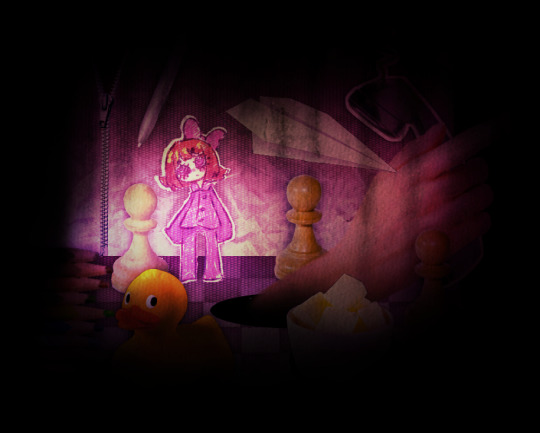
Which character in your game do you relate to the most and why? (Alternatively: Who is your favorite character and why?) *Mitty: "Ah I don't know, honestly. I think I can relate to every character in one way or another, and it's hard picking one, especially since the game isn't out yet and I'd like to keep most characters hidden until the demo. Marinette is definitely one of my favourites, though, I just love how innocent and cute she is. Her cheekiness can be made super interesting ahaha" *Third: "My favorite character is definitely Pierre. He’s a complete blast to write, and gives me lots of cool things to describe and say through him, from his magic tricks to his killer lines and quotes."
Looking back now, is there anything that regret/wish you had done differently? *Mitty: "Hm...Having organized things better in the beginning would have saved a lot of time now, but I don't think it's been that big of a deal anymore. I don't have any regrets that I'm aware of at the moment since everything until this point was necessary to learn and get to where we are now."
Do you plan to explore the game’s universe and characters further in subsequent projects, or leave it as-is? *Mitty: "I'm not sure yet, it depends on the reception and how willing I'll be to continue the story. Even though I would find it fun to make comics, another game or a different midia, realistically I can't tell how willing I'll be to continue developing content about it after the game is finished. Honestly, I hope I can develop more projects on Marinette, we do have content for that, and I absolutely love it with my heart! But it's also equally important to move on to another story. Only time will tell!" Third: "I hope to, but that day is very far away for me. I’ll be gone for quite some time after Marinette is finished, and I hope I’m not forgotten by the time I return. Perhaps I’ll entertain myself with additional short stories exploring the various aftermaths of the game."

What do you most look forward to upon/after the release of a project? *Mitty: "I honestly just want to get the story out there. I'm hoping people will enjoy it if they play the game, and will have a special place in their hearts to keep it on. This project means a lot to me, and having it making people feel things is what I'm looking forward to. I'd love to see other people playing it, definitely. I imagine I'll eventually be relieved to have finally completed it, it'll be a big moment for me to sigh be proud of creating. I'll be able to move on to work on other fun things while I see how this little child of a game is going to do out there in the wild, and that's always nice!" *Third: "Fan reaction, 100%. Having people ask me questions about my work and telling me how much they enjoyed it is my favorite part of writing."
Is there something you’re afraid of concerning the development or the release of your game? *Mitty: "Yes, I don't want to feel empty with nothing to do when I finish the game. I know it will be great and all, but I've been working on it for so long that it's hard to imagine not working on it ahaha! It's a really fun hobby, but it's also engraved in my heart. I want it to be the best it can be, of course, so I'm scared of bugs, inconsistencies and overall it being clearly a bad game. I'm hoping that people will help with critiques on the demo, so I have a better outside perspective of where we are going. I don't want to drop the game, so I'm scared of having to take a long break from it during the development. I'm worried of being a terrible team leader as well." *Third: "I dread plot holes more than anything, and I dread a dull and overall unimpactful story. I want a tale that will punch the viewer in the gut, hard. I want to make them cry. I want to make them laugh. I want them to draw what I wrote, and explore it further in hopefully-not-too-sexual fanfiction."
Do you have any advice for upcoming devs? *Mitty: "Don't be scared to start. You're going to suffer mid-way if it's a long term project, but keep pushing through, you'll learn a lot and it becomes easier with time. Take breaks and take it easy, step by step. LIST STUFF AND MAKE BACKUPS. Learn with short projects first. Ask for advice from people you admire, but never hold them on a pedestal. It’s always helpful to be a jack of all trades! Try to think from an outsider perspective if you're not sure of how it's going, and if you can, tell people you trust about the game and ask for opinions. Always take criticism well, but don't stress too much over harsher or even meaner comments. Have fun and never forget your starts, the people you meet and the reason you're doing the project for. If you're also an artist, writer, musician, remember this is a great opportunity to add something interesting to your portfolio. Cool visuals attract people, but they are not everything that will keep them hooked." *Third: "The best part of making a game is the people you make it with. The story is the most important ingredient of your game. Prioritize it first, and everything else will fall into place around it. Otherwise, everything will serve some other aspect of your game, and that’s rarely a good thing. Always speak your mind; do not every not say something just because it’ll hurt someone’s feelings. Obviously don’t be a tool, but if you ever have to choose between hurting the game and someone’s pride, pick someone’s pride. It’s much kinder in the long run."
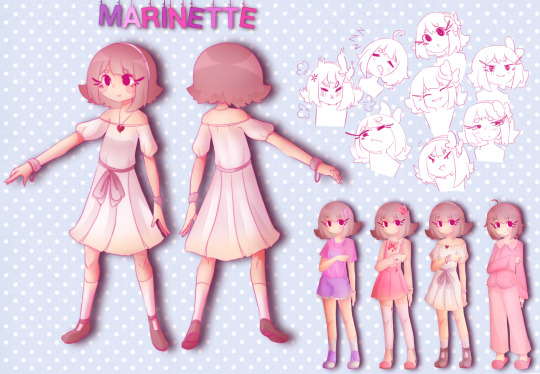
Question from last month's featured dev Froach Club: Have you ever had a moment where you got completely stuck or became intensely frustrated while using RPG Maker? *Mitty: "Yes I have, I think everyone has QwQ Despite silly mistakes, I've gotten stuck several times, but honestly it's usually either us doing something stupidly hard that can be done another way, or we are just not skilled enough yet, and it's better to come back later. You can usually do most things you wanna do if you have the advantage of knowing the programming language your RPG Maker Engine uses I think. Google is your friend always, and sleeping about it also helps. I once dreamt of a whole sequence to fix a problem, and it worked! ahaha Always take it easy and don't give up, but know your limits and the limits of the engine!"
We mods would like to thank Teal Crown for agreeing to our interview! We believe that featuring the developer and their creative process is just as important as featuring the final product. Hopefully this Q&A segment has been an entertaining and insightful experience for everyone involved!
Remember to check out Marinette if you haven’t already! See you next month!
- Mods Gold & Platinum
#marinette#rpg maker#rpgmaker#horror game#indie game#gotm#game of the month#gotm 2019#august#august 2019#teal crown#interview#horror#cute
341 notes
·
View notes
Text
Michael in the Mainstream: Joker

I don’t know if there is a single film as hard to talk about as Joker. I’m not talking about all of the manufactured controversy around it either; I just mean that this film is so dark, bleak, and heavy that it’s just so hard to figure out where to start. I will say this; the movie definitely has more in common with something like Logan than it does a Batman movie. It’s certainly not a traditional comic book film, with lots of action and excitement. Rather, this is a dark psychological thriller, a character study of a mentally ill man who means well but is slowly driven to madness by the world around him.
I’m sure you’ve heard everyone raving about Joauquin Phoenix’s performance, and they are absolutely not exaggerating. He is just mesmerizing as Arthur Fleck, the man who would become Joker. He is able to fill even the corniest lines with raw emotion, he truly sells how broken and battered this man is, and my god his laugh. HIS LAUGH. This is up there with Hamill’s laugh; it is so creepy, uncomfortable and with a sense that something is off about it that it gets under your skin. Even better: there is an in-story reason for his laugh, and while that may sound like the sort of cheesiness that resulted in Han Solo’s name, it’s actually done rather effectively.
I think the big thing with this movie is just how unabashedly uncomfortable it is. This movie doesn’t pull any punches in showing just how awful a place Gotham is, how sad of a person Fleck is, and how miserable his entire life is. From his uncomfortably emaciated body to his numerous mental problems to people everywhere treating him like garbage for his mental issues, this movie spends much of its runtime painting a painful picture of the sort of stigma that the mentally ill face. Fleck remains sympathetic for a good long while, but eventually he does cross the line (as he must; he does become the Joker, after all).
Still, while he is ultimately not sympathetic and the movie does not try to paint his actions as just, at the same time it’s hard not to understand what lead to all of this. Of course Fleck has culpability in what he does, but then you see what his mother did, what Murray Franklin does, what Thomas Wayne does, what his coworkers do, what his boss does, what strangers on the street do… it makes you consider if perhaps all of the blame really is on Arthur. We are all shaped by our environments, after all, and his was overwhelmingly bleak and negative and filled with tragedy.
Of course, that’s if you take everything you see at face value. One of the most clever things this film does is how it utilizes its lead character’s mental state to make you question whether what you’re seeing is real or not. There are some revelations late in the film that cast doubt on a lot of what we saw, and there are a lot of elements that are left ambiguous. The fact that we are following a character with an already fragile mental state and seeing the world through his eyes makes us question everything… and honestly, I think that’s a good thing with this movie. I think this movie, more than any I’ve seen in a long time, Is one that is meant to be viewed from different angles and perspectives, for each viewer to find their own meaning. It’s a film that seems perfectly constructed to allow this, to let many interpretations coexist with evidence to either one, but it never lets the film’s ambiguities overtake the narrative and swallow up the core concept: a character study of a tragically broken man’s descent into madness.
This film is a modern masterpiece, but I say this while also noting that this is not a film that will appeal to everyone. Again, comparing this to Logan feels apt; where that movie a stark contrast to the rest of the X-Men franhcise by being a dark, brooding Western with a post-apocalyptic aesthetic rather than a dumb action film with social undertones, Joker is a bleak character study that is dark and unpleasant (but in a good way) as opposed to the lighter, funnier, more action-oriented affairs Marvel and DC produce. This is a long way from Shazam, that’s for sure. As great as the film is and how I’d easily say it’s worth seeing for Phoenix’s performance, I can’t totally recommend this to everyone. You really need to understand going in this is not a traditional comic book movie, and that it is more akin to a psychological thriller like Taxi Driver (one of the chief influences of the film) than anything else. If that sounds good to you, or you just like Phoenix’s acting in general, you’re going to have a hell of a time with this. Otherwise, this film may not be your cup of tea, and really, that’s fine; I think the fate of any film like this is to be polarizing.
It’s so interesting, the conversations that have sprung up around this film. While I can’t say I’m a fan of all of them, this is one of the most dissected and scrutinized pieces of media I have ever seen, and there are so many different takes and interpretations on it even a few days after a wide release. I think this is one of those films that will be talked about and discussed for years to come, and it deserves it. I have rarely seen such an engaging movie that confronts me with horrible, uncomfortable truths about how we treat those who are different and how the negative influences of society can warp even the most harmless and well-meaning individuals into monsters.
But that’s just one possible take, a fragment of all my thoughts. To me, Joker is a lot of things. It’s an indictment of how society treats the mentally ill, demonizes, abuses, and stigmatizes them. It is a dark tale of how the mentally ill can be warped by toxic environments and bad influences into doing horrible things. It is a story about suicidal depression and negative coping mechanisms. It is a story about the cruelty of the rich and their apathy to the plight of the lower class. It is a warning to the dangers of punching down in comedy. It is a narrative told from the POV of the world’s most unreliable narrator, that will have you questioning whether what you’ve seen is really the truth or just the broken fragments of Arthur’s mind.
But most of all, this is exactly the sort of tragic tale that Joker would want told about himself. And I think that’s what truly makes this film great.
#Michael in the Mainstream#Review#movie review#Joker#joaquin phoenix#DC#comic book movie#psychological thriller
170 notes
·
View notes
Text
Body Image and Young People
This is a big topic that has so many layers to it. I have been trying to collect my thoughts the past few days in order to try to cover as much as I could, so I am going to do my best.
I want to begin by going into detail about my battle with my own body over the years, in detail, in order to create a clear image about what goes through someone’s brain that is struggling with severe confidence issues.
I never was a skinny kid, necessarily, but sports were never truly my scene. Throughout my last few years of elementary school and middle school, I was pudgier than most of the kids in my grade, but I was not an unhealthy weight by any means. That being said, as I mentioned, I didn’t play sports, so I was already a target for people that felt superior to me as someone who wasn’t athletic and was “heavier”. This was the stem of my self-confidence issues, but it didn’t get to its worst until I was in high school.
I became accustomed to swimming fully clothed at pool parties, wearing clothes that were oversized in order to cover any lines or bumps that I felt like were flaws on my frame. If that meant wearing sweaters and sweatpants in the summer, then that’s what I needed to do.
When I turned sixteen, I wanted to change my whole image into someone I wasn’t (see past blog posts) and started working out excessively and cut my eating almost entirely in order to lose weight, and in my head, get people to like me. I got results both physically and socially and ended up losing about twenty-five pounds, so I persisted. I was so focused on how I was viewed by people, that I failed to acknowledge the issue at hand until February of 2020.
My anxiety was at its peak and when Covid-19 hit, I found myself alone and focusing on nothing else but what I was eating, what I looked like, and what number the scale flashed back at me. I substituted all my meals with a powder drink that satisfied me for a few hours, and then I would repeat. I lost about twenty pounds in a month.
The way this situation is different, though, is that I wasn’t attempting weight loss in order to please others, it was a competition with myself, and it wasn’t a friendly one. I didn’t view it as what it truly was until I started passing out. One afternoon, I got ready to take prom pictures with my friends with a local photographer in my town. I went to go pick up my friends and got out of the car and they started speaking to me, but I could hear nothing--I blacked. I started sweating and couldn’t form my sentences properly. I would get up and walk to my bedroom when I felt it coming, and I would just wipe out completely. I knew it was an issue, but it was not enough to get me to stop what I had already started, because I wanted results. Anytime we would get carry-out or I would eat an actual meal, I would return to my room and tremble, thinking about every bite of food I had just consumed.
Although I am on a more nourishing and healthy track now, it is still a daily occurrence where I want to slap myself across the face for eating breakfast, for going out to dinner with my family, or for having a snack now and then. I have spent many a night, alone, driving around screaming and crying at nothing simply for feeling the way I do. It’s almost an addictive behavior that I didn’t want to acquire, but the truth is that I did, and I am doing my best to overcome the obsession that gets in the way of my everyday routine, and we are getting somewhere.
Enough about me, though. The reason I am writing this in the first place is because I have so much to say as it’s something I know I am still personally dealing with, and I know the majority of people my age are. If we are being honest, we all would change something about our body if we could. Whether it be that we want to lose weight, or gain it, we all have our personal battles. In today’s day and age, though, it’s a more toxic world regarding body image and perception. Here is why.
SOCIAL MEDIA
As of 2019, teenagers often spent up to nine hours on social media on a daily basis. The most toxic platforms for young people struggling with their body, in my opinion, would be Instagram and TikTok. Because most social media apps are programmed to spit out information and content that interests the user, the posts that are viewed are specific to each individual.
With Instagram, especially, everyone aspires to be an “influencer”. They are skinny, tan, have clear skin, travel, eat power foods, and young people love that. The reality is, is that most of us don’t live perfect lives like that, but we truly wish we did, so we want to get as close as we can.
With this, diet culture is a very popular concept among those wanting to bring a change to their bodies. Although this has been something that has been advertised for years now, mainly for adults, the new wave of diets for adolescents is scary. Most of them are malnourishing and can do more damage than one would think. Often times, though, they are bizarre or unheard of, but seem simple enough for someone who wants fast results. Because of this, once again, it’s easy for both myself and people my age to get reeled in quickly into that idea.
(I don’t want parents reading this to think that this necessarily entails that social media needs to be taken from their teenagers, but it is something to be aware of. Social media is a great way to stay connected (especially now) and gives us a voice to do good and bring change, as well.)
THE SOCIAL FACTOR
Because this is an issue that most of the youth deals with, whether it be minor or major, it can become a competition without intending it to be. If my friends are losing weight, why aren’t I? If they’re doing this diet, then I need to. They feel better about themselves than I do. What am I doing wrong?
If you find yourself feeling like this too often, and it gets to a point where it gets in the way of your relationships, then it’s a conversation to be had. You shouldn’t have to feel like you are competing with those you hold close to you, but you also shouldn’t feel like you have to walk on eggshells every time you are with them to not say the wrong thing. Find some common ground, and support each other at times of insecurity.
High school can be a terrible atmosphere for someone who feels like their weight isn’t ideal. Teenagers are quick to make mindless comments and insults about people’s appearance. Whether it comes from a place of low self-esteem themselves or not, it doesn’t justify it, and this can be a direct and harsh cause of body image problems.
THE MENTAL FACTOR
If someone struggles with general anxiety, depression, or another mental condition, having your body as an enemy can sometimes heighten the severity of the issue as a whole. It truly goes hand in hand. For me, my anxiety was at its worst when my eating habits were at its worst. I was focused on what I was eating, focused on what the scale read back to me, and in the rare moments I wasn’t fixed on that, it was worrying about other things happening in my life. Everything was just raised to a higher degree.
The two words I have been trying to avoid so far, “eating disorder”, is something that I would love to say is just a false or dramatic phrase, but the reality is is that it’s a demon, and a real one. With the world of social media, again, they’re often glorified to be an artsy aesthetic to be achieved. Eating disorders does not mean “just not eating”. It can be anorexia, bulimia, binge eating, body dysmorphia, and because there are so many forms, it’s not always going to be apparent just looking at a person. Often times it isn’t. That is something to keep in mind, because one of the most damaging things for someone struggling with an ED is making them feel like their issues aren’t valid because it’s not physically obvious to you, or that someone else is worse off in your eyes.
HEALING
The first step that has helped me, personally, is just becoming comfortable. I need to become comfortable with myself in the way I am now for me to appreciate any way my body looks in the future. If I’m unhappy with myself now, when am I ever going to be happy, regardless of the supposed improvements I’m making? It’s been a tricky thing for me to figure out, but I force myself to go to pool parties, I hang out around the house sometimes just wearing underwear, so I can become familiar and comfortable with seeing myself and my body so I can reach a point to where that’s normal.
The next thing is to follow the steps that you know are going to be beneficial and healthy for you. If that means working out to gain muscle, to lose weight, or dieting, then do it, BUT do it in such a way that is going to be, again, beneficial. Don’t go to the extremes for quicker results, because you will end up falling down a hole that will be hard to climb out of.
Lastly, if you see fit, go to therapy! There’s a large stigma around therapy as it makes people think that those who go are insane or can’t function on their own, which is far from the truth. Think of it as more of a helping hand from someone who has a different view and has solutions that may be overall helpful. Reading this blog is simply just how I see things, and that goes for any post I make. I am not a professional. I am not an expert. I am an eighteen year-old that just wants to share his experiences in order to bring awareness. There are many great therapists out there, and there are several websites you can visit to find one that meets your needs specifically.
I am overjoyed to see that the modeling industry, for example, is heading in a more positive direction as far as inclusivity goes. Plus-size models, LGBTQ+, and people of color are booking shows, spreads, and can be seen on billboards. This is just the start, and the rest lies within everyone as people to stop shaming others for their appearance, because if we didn’t from the beginning, there would be no reason for anyone to feel uncomfortable in their own skin to begin with. Imagine a world free of judgment for a moment. Imagine how differently every single person on the planet would be living. It’s something to think about.
I want to reiterate--don’t be afraid to ask for help! It is a direct demonstration of strength, rather than weakness, to admit that you need an outside source to help you get through whatever battle you may be experiencing.
And as always, be kind to one another and stay safe out there!
2 notes
·
View notes
Note
Stephen King once said that his muse is a man who lives in the basement. Do you have a muse?
Oh it’s absolutely, for sure Taylor. Her music especially, but everything about her really. I love shuffling through her songs bc essentially it’s just shuffling through AUs/stories to dream about like you’ve got:
Love Story (2008) - the classique of fic inspiration. Only two types of people in the world - people who proudly spent their youth daydreaming about their OTPs in medieval/fantasy AUs while listening to “Love Story” and motherfucking liars.
I Know Places (2014) - Spicy “Love Story.” Still a forbidden love AU, still definitely lends itself to fantasy, but now there’s higher stakes. Less ‘corsets & swords,’ more ‘dark cloaks & running through eerie woods with only the moonlight to break the darkness.’
Don’t Blame Me (2017) - Time for a demon!AU babey!!! Or any other dark entity that was forbidden from ever loving a mortal... until they meet That Mortal. That or just the general ‘queer characters oppressed by christianity are freed by realizing that true faith is love.’ You hear this song, and before the fic concept has even fully crystallized you’re putting it in a playlist with ‘Take Me To Church’ by Hozier and ‘Heaven’ by Julia Michaels.
This Love (2014) - Listen. You hear those opening notes and that’s it you’re having a full fledged fantasy about an AU where one is a mermaid/siren with scars and bioluminescent scales and the other is a human. Angst with a happy ending, babey!!! I have read several fics with that exact description and every single time I have to scream into a pillow to stop myself from asking the author if they know this song bc I know if I do they’re gonna answer with some whack misogynistic shit about Taylor that makes me have to block them. That’s angst without a happy ending.
Begin Again (2012) - First dates? Coffee shops?? A character who’s been hurt before realizing that it actually is possible to find love that’s happy and healthy??? I am already opening a new document.
Cruel Summer (2019) - says ‘oh?? It’s summertime and your OTP is young and having their gay-wakening as they spend long nights together in an attempt to escape the oppressive eyes of society and ennui of adolescence?? Dope. You should write a fic about that.’
Style (2014) - So inspiring and also versatile?? Could be an old-school greasers/socs Outsiders type thing or a modern punk/pastel AU. Also the music is so fucking sexy yknow when fics have that like smoldering heat vibe to them?? Literally never goes out of style.
Enchanted (2010) - Goddddd I know it’s been said and that Enchanted is actually one of Taylor’s most popular non-single songs outside of her fandom but Enchanted really is the best piece of ‘love-at-first-sight’ media ever written. The way it has all the romance of meeting someone and just immediately knowing that there’s something real there and they’re going to be important but in a very realistic way where it’s not ‘love’ yet bc you can’t love someone you don’t even know, it’s just that breathlessness and the feeling you’ve just been hit by fate out of the blue oh my god. Ohhh my god.
SuperStar (2008) - One’s a famous musician and the other isn’t. Guess what happens next? It’s you picking up a pen to write it.
It’s Nice to Have a Friend (2019) - If it doesn’t get you to write a childhood friends to lovers fic, “Mary’s Song” (2006) will.
Call It What You Want (2017) - has one person (or both people) in your OTP just really Been Through It? Hell yeah they have, that’s why it’s your OTP. Time for a fic based on “Call It What You Want.”
Come Back... Be Here (2012) - Is your otp in a long distance relationship, in canon or in a fic? There’s a Taylor song for that.
Wildest Dreams (2014) - If “Wildest Dreams” doesn’t make you black out and experience a full-on Old Hollywood fever dream starring your OTP then we simply do not vibe. The passion. The secrecy. Taylor’s literal heartbeat in the background. I can physically see the fic playing in my mind.
Dress (2017) - Let me hear you say ‘friends to lovers’ let me hear you say ‘smut with feelings’ let me hear you say ‘schneeplebro anthem’ let me hear you say ‘Chase in his gray shirt and a lil dark pink skirt that matches the brim of his hat.’
Starlight (2012) - Your OTP but it’s on the boardwalk in the 1940s because why the fuck not??
Speak Now (2010) - no one cares about a ‘Person A objecting to Person B’s wedding to someone else’ AU until suddenly “Speak Now” starts playing and then all bets are off
The Way I Loved You (2008) - is really it’s own AU like idk if there’s a name for that AU but can you really listen to it and tell me you don’t want to make it a fic?? Uhhh I think the fuck not!
Ok I’ll stop but like... these are just a few tbh jhgjfhg. I also just in general find her inspiring as a writer in general, like how she’s always throughout her whole career refused to apologize for the way she interprets her experiences through writing and how she talks about how the most important thing you can do is to just keep creating no matter what mmmmm yeah I just love her a lot.
2 notes
·
View notes